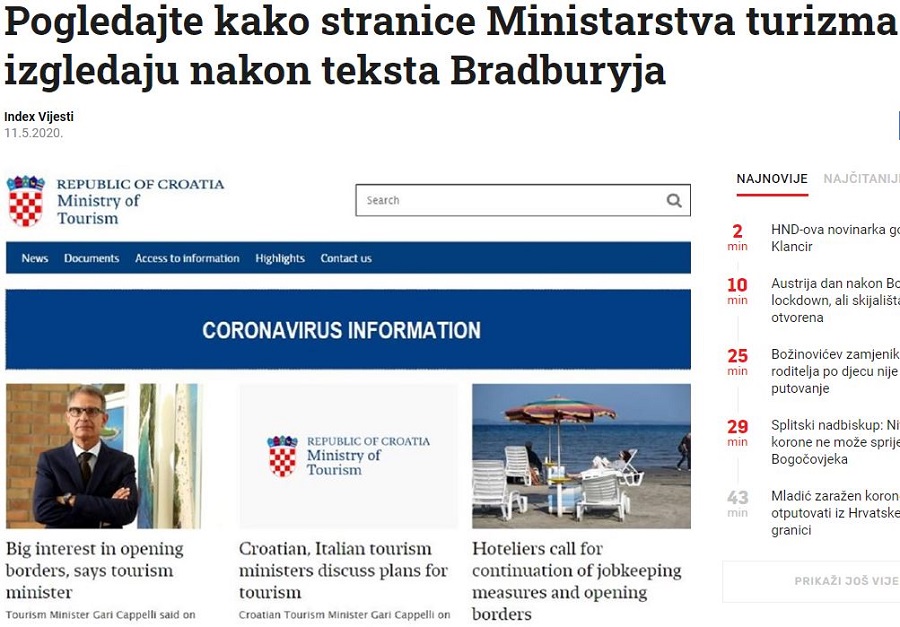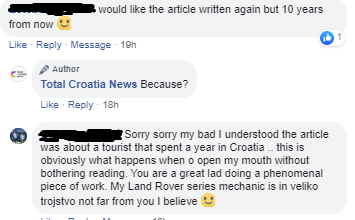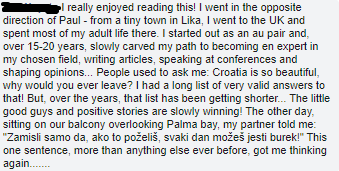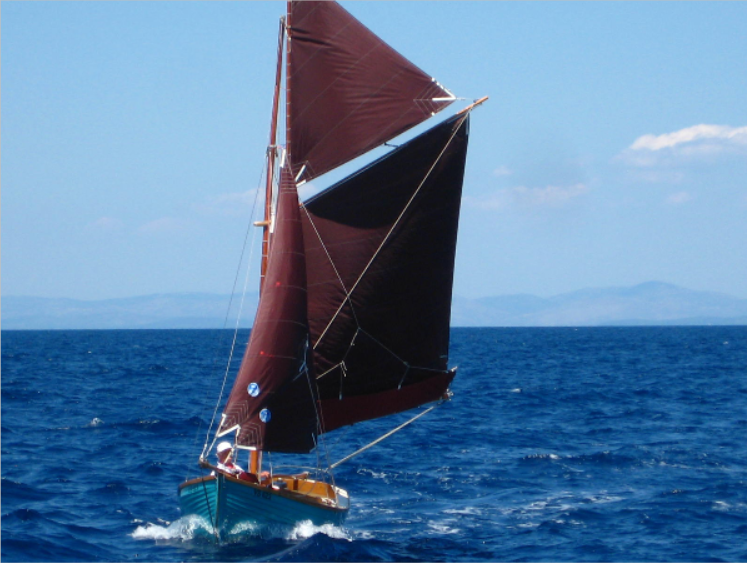Good and Bad of Living in Croatia: Reflections 10 Years Later
April 29, 2021 - TCN contributor Valeria Teo reflects on living in Croatia 10 years later.
I have been second-guessing myself for writing about the good and bad of living in Split. There are various online discussions on similar topics. The positive and negative comments from both local and foreign people living and/or leaving Croatia can be antagonistic. But the answers, whether they are good or bad things, are inevitably personal. So the antagonism surprises me even more than the answers themselves. This gets me to think about another irrelevant issue. Can I "complain" to and about my Croatian husband even though I do not want a divorce? I see sufficient goodness in him for us to be together. But he still annoys me on some good days and pisses me off on some really bad ones.
Back to the original question for this piece. I actually do not have better insights or more original ideas than are mentioned elsewhere. The diversity in this country can appeal to people with all sorts of preferences. All I can say is that life in Split suits me at this stage of my life: fewer people, slower pace, better climate, nicer environment, more freedom, less fear ... These are what I call the background factors. We only know we want them when we had the opposite or even none of them. And there are things we have to deal with on a daily basis: money, food, health, work, socialising, parenting, elderly care ... Daily frustration usually comes from these areas. Living in certain bubbles can avoid some of them while certain life stages can bypass the others. As we inevitably attach different weights to the background factors and give our own priority to the daily things, they affect our experiences in Croatia in myriads of ways.
My interactions with Croatia have changed in the last 10 years and so have my experiences of living here. I arrived at an age when it was difficult to find a new job or get a new friend even back home. But modern technologies kept old circles within easy reach. So I rarely found myself frustrated in those early days. Even my residency application was pretty straightforward. Having zero prior knowledge, I could not tell whether a processing time of 2-3 months was considered fast or slow. I hardly complained about MUP as my husband and I just went with their flow. They told me the most important thing I needed to know at that time: I could stay as long as the application was being processed. But we found out later that having the temporary residency approved earlier did make a difference: I had to go to the hospital without Croatian health insurance. We were busy mourning rather than crying over the hospital bill which was not big anyway.
My understanding of the Croatian health system expanded further when my prenatal visits began. That was also the time when the Croatian language bothered me time and again. But my gynecologist was trying his best to take care of me. And I learnt the most important Croatian words in that period: sve u redu. Again, I had had no previous experience in this area to compare with the one I had in Croatia. I was as contented as any woman who has a problem-free pregnancy. Labour, or I should say post-labour, was a bit bumpy and gave me a full-fledged experience of hospitalization in Croatia.
The journey actually started off really sweet as the taxi driver decided to give us a free ride to the hospital. Croatia surprises me many times and especially at a time when I least expect it. The Clinic for Women's Diseases and Obstetrics in its present building was pretty new 9 years ago. My neighbour told me afterward that the facilities were much better than the old one where she had given birth. They were indeed. I did not expect to be put in a semi-private room in a public hospital. Knowing how medical professionals work in public hospitals in Hong Kong, I tried not to bother them unless it was absolutely necessary during my 2-week stay there. I could feel that the language barrier on top of their workload stressed them further. The doctors concluded, after some tests and scans, that bed rest with a tight wrap or girdle around my hips was all I needed. Total recovery indeed came after 3 more weeks of the remedy at home. My friend told me that it was likely to be postpartum pelvic girdle pain. In hindsight, I was kind of optimistic about having my only child here. If I had known about RODA then, I might have prepared better for my pregnancy in Croatia.
The emergency room and other clinics for specialty doctors in Split hospital remind me of the public hospitals in Hong Kong: I once spent half a day in the waiting room for an ophthalmologist to check my eye for less than 10 minutes. It was the same for all the other 3 appointments that followed. Would I like to wait for less time? Absolutely! Did I complain about it? Not really, as I knew how public hospitals worked. When I learn that Hong Kong people moving to the UK have to pay 55 Euro per adult per month for the National Health Service, I have a new appreciation for the Croatian public health system despite the imperfections.
Having a child in Croatia also gets me into the most controversial and stressful sphere in life: parenting. The natural environment and safe space kids can enjoy in Croatia are second to none. That is immensely helpful to parents who stay with their children 24 hours a day. Then comes the most welcomed daily breather for all stay-at-home parents: kindergarten. While Hong Kong parents and pre-schoolers stress and work hard to get ahead, the counterparts in Croatia relax and enjoy their carefree days. Is the Croatian way a good thing? For me it is. But like everything else related to parenting, the answer really depends on whom you ask.
Opinions only get more diversified when children begin schooling. I have listened to my friends, living in different cities, talking about the good and bad of public schools, private schools, international schools... you name it. Parents in Croatia are no exception, I guess. So the conclusion is pretty simple: no school is perfect for any parent. My parents probably thought that I was in the best available schools in our neighbourhood at that time. But none of them taught me how to live in Croatia (there was only Yugoslavia anyway). I am pretty certain that no schoolwork could have prepared us for what has been happening since the pandemic started. Did schooling help me at any stage of my life? Definitely, but little has to do with the textbooks I read or the tests/examinations I passed. The ways I treat schools as a parent are very similar to how I handle life in Croatia: take full advantage of the good bits to help my son develop and get by with the "bad" parts to satisfy the institution.
One thing I like the most about schooling in Croatia is that children do have spare time. Besides enjoying their own leisure, children can explore and pursue many different activities and sports without breaking their parents' banks.
An article about the good and bad of living in Croatia cannot be complete without talking about the bureaucracy and paperwork. I have had my fair share of them after getting my residency and citizenship, buying and renovating an apartment, opening a Croatian company, and getting the required permits. In my experience, it always feels the worst in the preparatory stage. It is more about finishing one task after another once the process gets started. When I focus on the task(s) at hand without thinking too much about anything else, all the applications and procedures are hardly enjoyable but bearable.
I must also say that Croatia has come quite a long way in the last 10 years: more online services, better English websites, all kinds of English-speaking service providers, and numerous expatriate-local communities all over the country. Is it a good thing that Croatia is becoming more international and making life easier for foreigners? Everyone's opinions are different. Coming from a once international city and finding my home here as a foreigner, I only have one obvious answer.
For more about lifestyle in Croatia, follow TCN's dedicated page.
Moving to Croatia to Live, an Englishman’s Perspective
April 6, 2021 - What's it like moving to Croatia? TCN contributor Dave Hall shares an Englishman's perspective.
I have been married to a Croatian lady for over 25 years. She came to the UK as an au-pair at the age of 19, where up till last year, she has spent most of her working life. During that time, we have returned to Croatia many times to visit family and have holidayed in different coastal resorts. We love the people, food, climate, and local culture and hoped that one day we would retire here.
The Covid-19 pandemic and Brexit pushed us to reflect on our future and last year we decided to sell our house and move to Croatia to live full time.
So, what has it been like living in Croatia?
Osijek, a hidden gem
Currently, we live in Osijek, where we have a small flat which we purchased some 10 years ago. Osijek is a lovely place to live, apart from the cold winters and mosquitoes in the summer which just love me. The people are friendly and easy to engage in conversation, even in English as my Croatian is not yet very good. My goodness, Croatian is such a difficult language to learn.
I love the way Osijek is still very family-centric and a safe place to live. There is a general feeling of friendliness, people always say hello, they smile and like nothing more than to talk, especially in the café bars.
Culturally, Slavonians have some lovely, if not quirky, things they love to do. They love to celebrate, whether it’s about sport, a saint’s day, the arrival of a baby, or getting married. Any excuse and they go for it. I have attended a few weddings here and, believe me when I say, it is an experience not to be missed. I hope to attend many more parties after the pandemic is over.
Osijek itself is a gem of a place. Very open, lots of green spaces and everything one would like in a town with a good theatre, cinemas, shopping and places to visit as a local and tourist. There are good schools and an excellent university.
The town has a Lido, which is in the process of being refurbished, and an indoor swimming pool and of course an excellent football team with a new stadium being built.
The riverside is a lovely place to take a stroll. There are lots of cycle lanes and provisions for dogs to run free off the lead. There is a definite emphasis on health, with most of the open spaces having facilities for children to play and adults to exercise.
The local council, considering their limited financial support from the Government, do their best to keep the town a clean and pleasant place to live. The open spaces are well kept, transport is clean and regular and with several recycling centres, getting rid of household rubbish is easy and free.
Since being a resident here, we have had several tradespeople in to do work. Starting early and normally finishing late in the afternoon, whatever the job, they were hard-working, knowledgeable and the workmanship was of good quality but finding the trades was extremely hard.
Osijek seems to be a forgotten town when it comes to investment. Taking a train to Zagreb takes longer now than it did when I first came here in 1993. There is an airport that could easily become a hub for the airlines, not to mention providing cheaper flights overseas instead of having to travel to Zagreb. And then, there is a River Danube that could become a major tourist destination and commercial port.
A new IT business park is currently being built but I have wondered why the likes of Amazon, Ikea, and other logistics companies have not set up here? The area is ideal for a logistics hub with plenty of labour, the motorway, an airport, the river port, and the space to build. I think a good opportunity is being missed.
A lot of investment in the town is happening, but I have a concern Osijek will become a beautiful place but without the investors in jobs it will end up with lots of empty buildings. They could consider making the County a free trade zone, a gateway to the EU.
It's all about the paper
One thing is for sure, living in Croatia means filling in many forms! Getting my OIB number, health insurance, driving licence, and registering my residency with the local police was not difficult but frustrating at times. Some local officials did not understand the rules even though the information was very clearly defined on the government website, that is until Article 75 came along and in my case, I had to re-apply using the same paperwork, the same photo, have my fingerprint retaken and pay again. Surely if the civil service had all they need to issue the first residency card then it surely would have taken less people's effort, time, and money to re-issue the electronic card with the information already held. We even had another visit from the Police to check we were genuine applicants!!!
I don’t know who was more embarrassed by their revisit, us or the police. I should say that our local officers who handled our case were excellent and very helpful.
Health services
We have found a good doctor, vet, and dentist who are all most competent with high standards.
The health service, which unfortunately I have had to use, I have found exceptionally good. OK, it’s not as streamlined as the NHS, for instance, I had to have four blood tests where one should have been sufficient, but it seems every department wanted their own test done and one has to get used to the paperwork! But the people were very helpful and as dedicated to giving the best care as any I have come across during my life.
During my stay in the hospital, I was made to feel very welcome and they went to great pains to make sure I understood the medical procedure and the treatment I was receiving. Even the food was acceptable albeit different from what I am used to. I have to say the beds were certainly more comfortable than in the UK.
The hospital in Osijek is old, but I am told work should start this year to build a new one.
Covid
Like the rest of the world, Croatia has had to contend with the issues and problems managing the Covid pandemic. Here in Osijek, most people have been sensible, following the guidelines and rules set by the county. In my opinion, they have done their best in difficult times. Part of the reason we came to Croatia when we did, was because we liked the way the county was handling Covid. We both thought it would be a safer place to be. Unfortunately, my wife and I have both had Covid and recovered without any major issues, thank goodness.
The EU as a whole has not been that great at getting enough of the Covid vaccine and it does appear that Osijek is not getting the fair share it needs to protect the local population when compared to other parts of the country. My doctor has a list of 300 vulnerable people including myself where the vaccine certainly would have saved a few lives and the heartache of losing someone. Yet, she only received 60 doses of vaccine so far.
Entrepreneurial mindset
What is very noticeable is how many young people have emigrated looking for work and better opportunities. Sad, but not unsurprising as finding a job here is very difficult and the remuneration is often below the government guidelines.
There is a clear need to create opportunities for young people to stay in Croatia and start businesses, but starting a business here is anything but easy. Although there are clearly a number of business opportunities in this beautiful country, what is lacking is the entrepreneurial mindset.
Starting a business here is a nightmare. By this I mean, the paperwork, the fees you have to pay not only to the government but to trade bodies, local chambers of commerce, people you don’t even understand why they should be involved and of course you must have lots of permits and certificates and a couple of spare trees and a filing cabinet for all the paper. All before you even started trading or making any money.
The government and banks really need a shove up the backside. Getting started in any business should be encouraged and supported by the financial sector and the Government. It seems to me that the opposite here very much applies. So much so, we are reconsidering starting a business.
Things are changing, but in my opinion slowly. All these antiquated rules and laws that stop people from taking the risk to start a business should I hope be a very high priority for not only the Government but the local officialdom who seem to have their own interpretation on how things must be done.
I was told people here are negative but, as far as my experience goes, I don’t think they are negative but many have given up trying to change things as it is so difficult. Bureaucracy is rife and much more depends on who you know and your position when trying to get things done. I am sorry to say, I have also come across some very incompetent people as well.
Future is digital, to a point
The broadband we have is very good, reliable and fast. In our case, we get 160mbs which is excellent.
But I cannot believe how bad most of the websites are and e-commerce is very underdeveloped. We are used to buying a lot of goods online, but here, not only finding what you want is difficult but most websites are not optimised for mobile. Goodness, that is not acceptable. It's not that Croatia does not have the skills and people to develop and manage an e-commerce website, it appears no one wants to invest in their online future.
Customers are looking to shop online but it isn't easy to find what you want at a good price. Sadly the answer has to be 'No'. It is the business mindset that needs changing. Businesses could sell much more if their websites were professional and usable. You try finding things using the search facility. Don’t bother, they don’t work, you are forced to find the link to open a catalogue and then spend hours looking for what you need. No wonder no one bothers. A good example of how to get it right is the parking app I use. I can park and pay anywhere in Croatia just by pressing a few buttons. Fantastic.
Could do better
Are there any downsides? Yes, of course, no country can claim to be perfect. I do understand Croatia has a small population and the government limited resources but I think they should re-look at the economic model. There is too much reliance on tourism. Supporting business start-ups, foreign inward investment, and effective regulations should be the focus post-Covid. Croatia is famous for its beautiful food and wine but only exports to a very limited market when there is scope to do more and better.
There is a definite lack of serious competition between supermarkets. All seem to have high prices and special offers. Perhaps they should offer lower prices and compete on the quality of the products and service rather than their special prices. The supermarkets and larger outlets must be laughing all the way to the bank. Osijek County (Slavonia and Baranja) has acres of fertile land so why is it you can’t buy local good quality produce except in Lidl and the markets.
It is expensive here. Food, electricals, services, etc are all VAT rated and at 25% is high by the world's standards and for local earnings. Cars are very expensive with import duties unrealistic compared to what people here can earn. It appears most loans have to be over a very long period to buy what is considered “luxury” goods.
Don’t even start me on estate agents and their deplorable marketing with huge fees, especially on the coast. Are some breaking the law by charging the seller and buyer and in some cases even asking for the buyer to sign a contract and charging to arrange a viewing? Looking on the government website, to be an estate agent, it is very clear what they should be doing in the way of contracts, marketing, and setting a fee for their service.
For me personally, the hardest thing about living in Croatia is the language. It is very hard to learn and speak as it's totally different from my native English. Despite that, I love it here. We are making friends, enjoying the café culture and even our dog has relaxed into the Croatian doggy lifestyle. In fact, he has more friends to play with than we do. Was it a good decision to move? Yes, very much so but like anyone who lives abroad, I do miss being able to see family and friends. Although covid has stopped that happening. Things can only get better.
For more about lifestyle in Croatia, follow TCN's dedicated page.
Learn more about living in Croatia HERE.
Croatia's Default Negativity: a Hong Kong Perspective from Split
February 14, 2021 - There has been a lively discussion on TCN recently after the default negativity in Croatia. We are delighted to welcome Valeria Teo to give us a Hong Kong perspective from Split.
The recent TCN article What Happens When a Foreigner Writes Positively about Living in Croatia? has had my inbox a little fuller than usual, with some very interesting contributions. Among them, Valeria Teo, a Split resident for more than a decade after originating from Hong Kong. Here is her very interesting Hong Kong perspective.
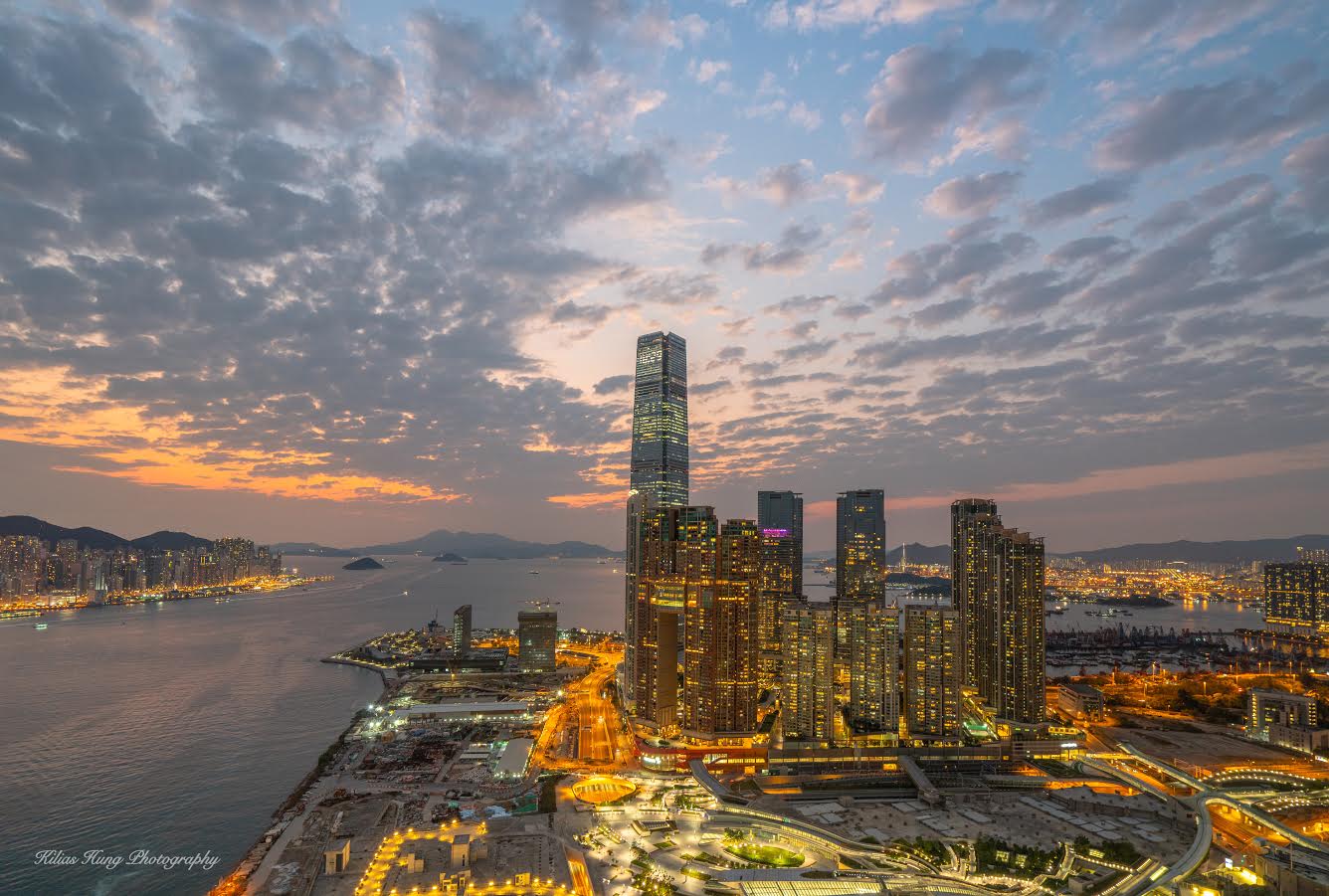
{Photo credits Kilias Hung)
I read this interesting article about what happens when a foreigner writers positively about Croatia as I am entering my 11th year of living in Croatia. In case these questions start popping up in the minds of some local readers, they may rest assured that I am not a millionaire, nor was I running from something in my own country 10 years ago (this may change now but more on that later) and never have I worked for any intelligence agency. It hit me a few days later that these little amusements could actually be serious disclaimers. A new perspective has started to dawn on me. This Croatian negativity on foreigners choosing to live in this country suddenly makes sense to me. What I mean is that I have started to feel the hurt when Croatian people ask foreigners those questions. The 10-year residency here certainly helps me understand the reasons. But I grasp it on an emotional level, strangely, because of what is going on in Hong Kong, the city I have left behind.
When I turned up in places, like a klapa concert or the 100th birthday for Hajduk in Poljud, 10 years ago, local people did not expect to see foreigners, let alone an Asian face. I was answering those typical questions over and over again for quite some time. While having a Croatian husband eased some suspicion, my main reason for moving here raised other eyebrows. They could not understand why a country with an unemployment rate over 20% was a better place to raise kids than a city with almost no unemployment at that time. They saw no future for my son here. Some might even secretly wait and see when the realities in this country would force our departure, sooner or later.
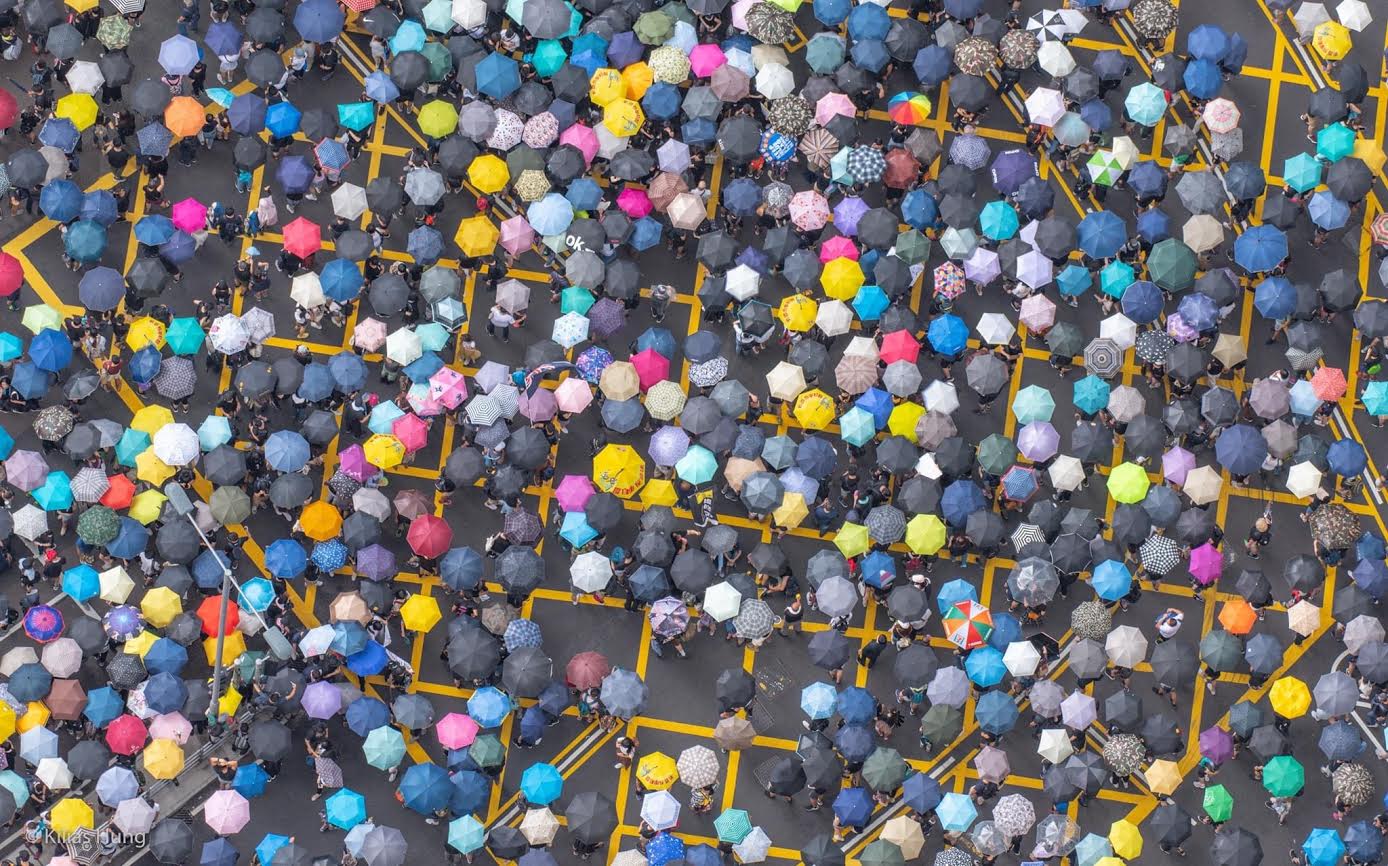
(The 2019 demonstrations - Kilias Hung)
I have met a whole spectrum of local people in the last 10 years. Whether they are positive or negative about their own circumstances or the country in general, almost all Croatians I have met are unwilling to leave their motherland. They love their country but hate the circumstances surrounding their livelihoods in varying degrees. Those who feel more helpless in their own situations are usually the more negative ones. They express it as anger, depression, bitterness or despair with an underlying agony. The desperate ones eventually try to improve their livelihoods by leaving Croatia. But they never think and want the departure to be permanent.
This, for me, is a familiar story because it is very Chinese as well. It happened to millions of Chinese all through history. I notice lots of similarities between Chinese and Croatian people when it comes to family, home and nation. Stability is at the core of our cultural DNA. So it is easy for me to understand the Croatian reluctance to leave their country and their yearning for home. But I did not see the connection between these cultural values and the negative emotions until Hong Kong started going through the biggest political repression and social trauma.

(This is a mysterious facility on the highest mountain in Hong Kong. The government is very vague about who is using it for what. The red slogans were put there at the beginning of 2021. They read from the top in simplified Chinese (Hongkongers use traditional Chinese): Following the (Communist) Party, listening to the Party. Capable of fighting, capable of winning. Photo credits: Lucia Yang)
Similar kinds of negativity are building up in Hong Kong as nepotism, incompetence, injustice and tyranny are spreading like cancerous cells. It is difficult for me to compare the situations of Hong Kong and Croatia. What I have learned after living in both places is that foreigners can "shield" themselves from the smallest to the biggest problems bothering local people on a daily basis. While foreigners can understand or even empathise with the local people, they rarely have the same kind of ownership to those problems. Foreign understanding of the local situation, no matter how deep or extensive, is still some emotional steps away from the local one. So I am in a strange "no man's land" living in Croatia while checking on Hong Kong. But the negativity, expressed in similar nature and intensity in Hong Kong, seems to show me some glimpses into the Croatian sentiments.
Grief and anger start when the unthinkable world is unfolding and turning the familiar life upside down. Outrage and frustration follow when the worse is never the worst. Bitterness and despair seep through when the unacceptable acts become the new normality. People are traumatized in this process whether or not they are trying to find a way out. Venting is a way to keep their sanity and relieve the agony.
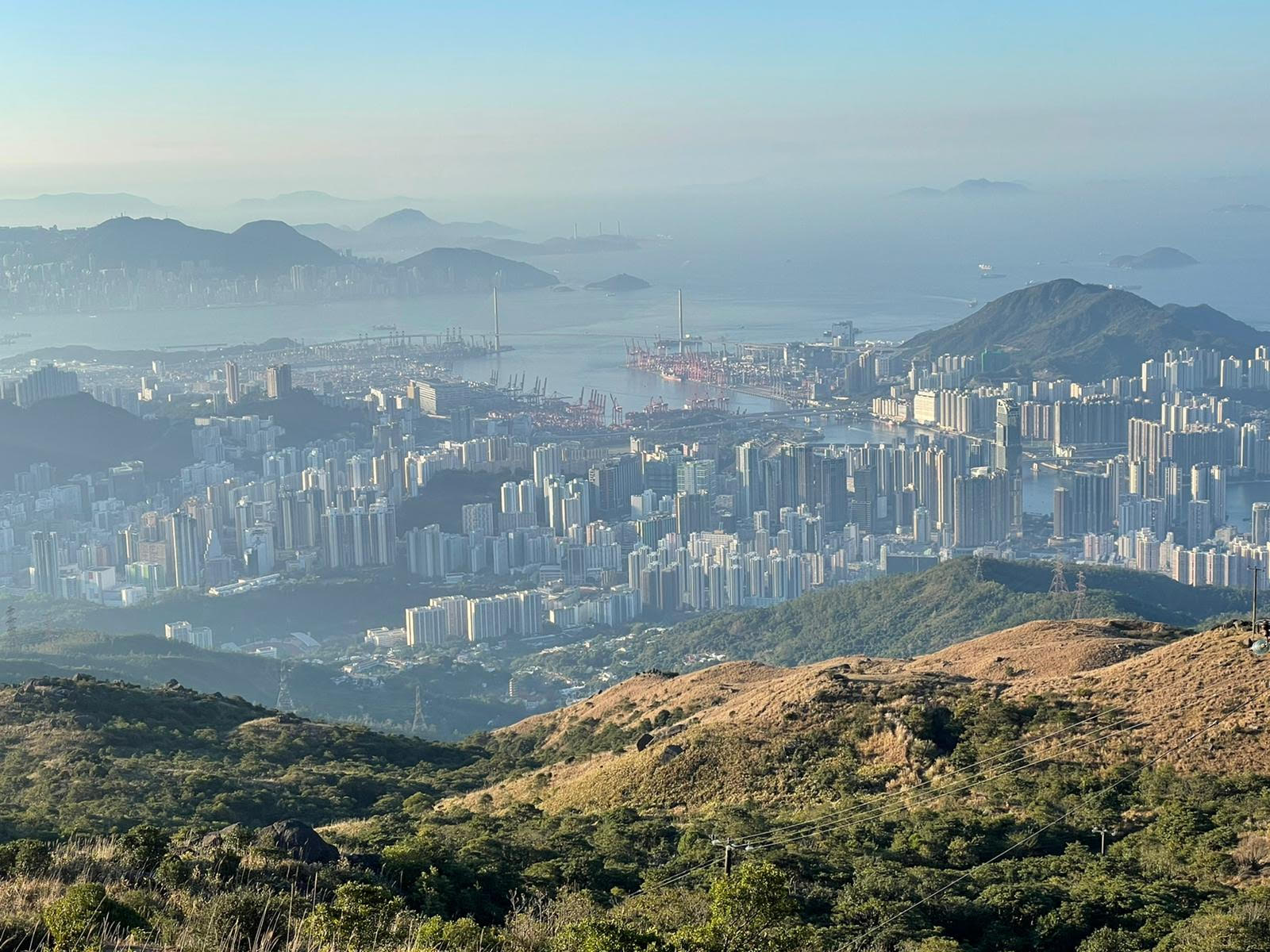
(Photo credit Nelson Tse)
What I have depicted is my own emotional journey through the collapse of a city to which I am not so heavily attached. The hardest blow, for me, is that Hong Kong does not deserve this tragic destiny. When the devastation strikes a place loved as the ultimate home and the best place in the world, the negativity of those people reaches the Croatian level.
I am not saying this is what actually happened to the Croatian people. The collective trauma in Hong Kong I incidentally witness simply gives me a different perspective on what I have experienced here. If Croatia is indeed a precedent of such traumatic malaise, the road of recovery is tortuous. People are just beginning to leave Hong Kong, go into exile, seek asylum or go into jail while the draconian rule is settling in place. Nobody knows how to get out of this dark and seemingly endless tunnel. Many Hong Kong people try to find inspiration and consolation from the works of Vaclav Havel. When I read "Power of the Powerless" 30 years ago, I never thought that it would get popular in Hong Kong. The possibility of that little shop he described in Prague could turn up in Hong Kong is completely surreal. Hope becomes the most valuable thing in the darkest hours. So it comes as no surprise that this quote of Havel's circulates quickly:
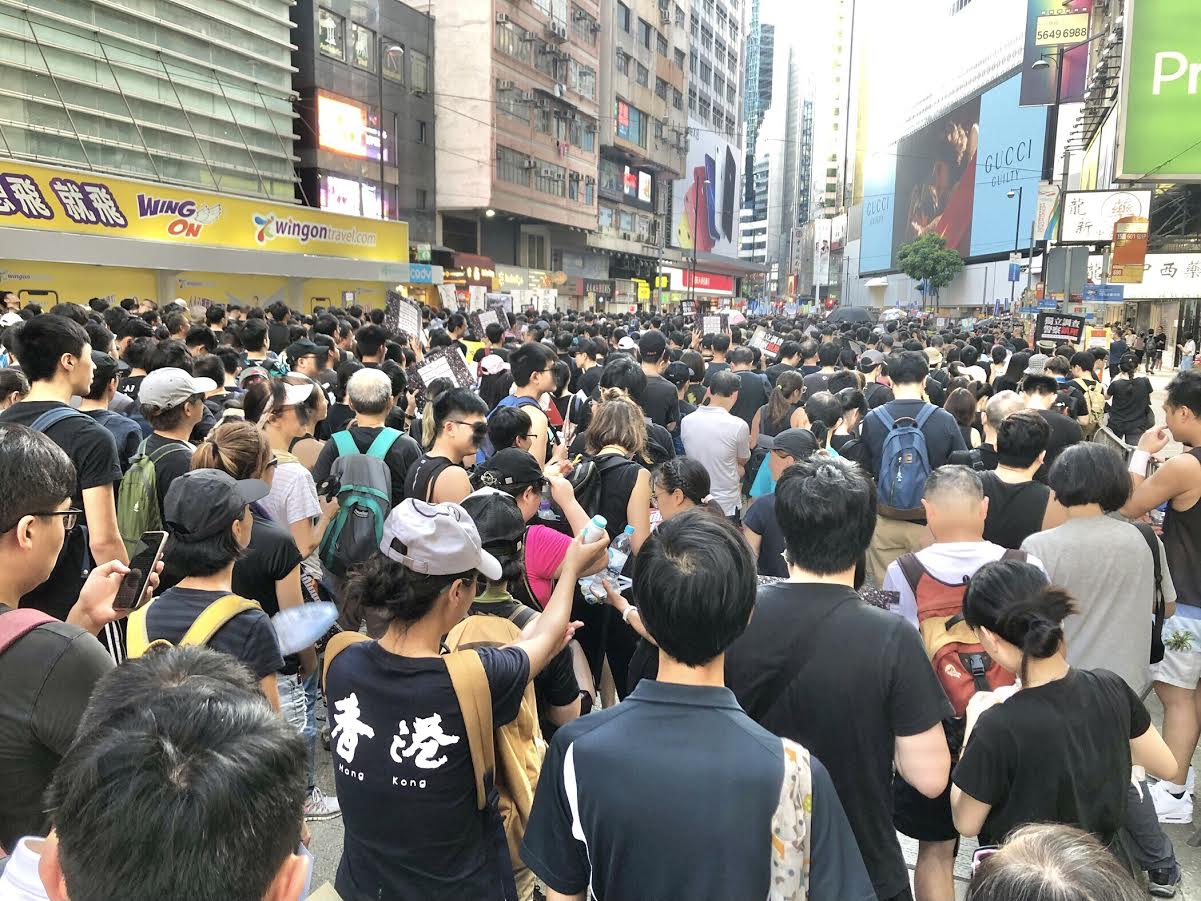
{Photo credits Kilias Hung)
Hope is not a conviction that something will turn out well, but a certainty that something has a meaning regardless of how it turns out.
The situations in Hong Kong and Croatia are completely different now and then. The similarities I have found are perhaps more for my own sake than anything: the kind gestures and the good deeds happening in a country many consider "hopeless" give me hope.
About Valeria Teo:
I left Hong Kong and moved to Split in January 2011 after meeting my husband outside kazaliste in 2007 and getting married in 2008. We have been welcoming guests to our apartments in Radunica since 2014. I also work as a tour leader whenever I feel like having a break from the craziness of being a full-time work at home mother. You may check out our website and follow our Facebook page.
If you would like to contribute to TCN, drop us a line at This email address is being protected from spambots. You need JavaScript enabled to view it. Subject Writing for TCN.
What Happens When a Foreigner Writes Positively about Living in Croatia?
February 6, 2021 - Is it possible to be a foreigner living in Croatia with a positive experience if you are not a millionaire or running away from something at home? What happened when a contented Dutchman wrote about 20 reasons why Croatia is a great place to live.
The longer I live here, the more I begin to understand things (although it would take a foreigner ten lifetimes to completely understand all the quirks of living in Croatia). Once I came out of my happy Hvar tourism bubble and figured out more or less how Croatia works, I could better understand why locals were so skeptical of enthusiastic foreigners talking about Croatia as the best place to live. Easy to say if you are living on the coast with access to Daddy's credit card, with no understanding of the daily grind people go through here to survive.
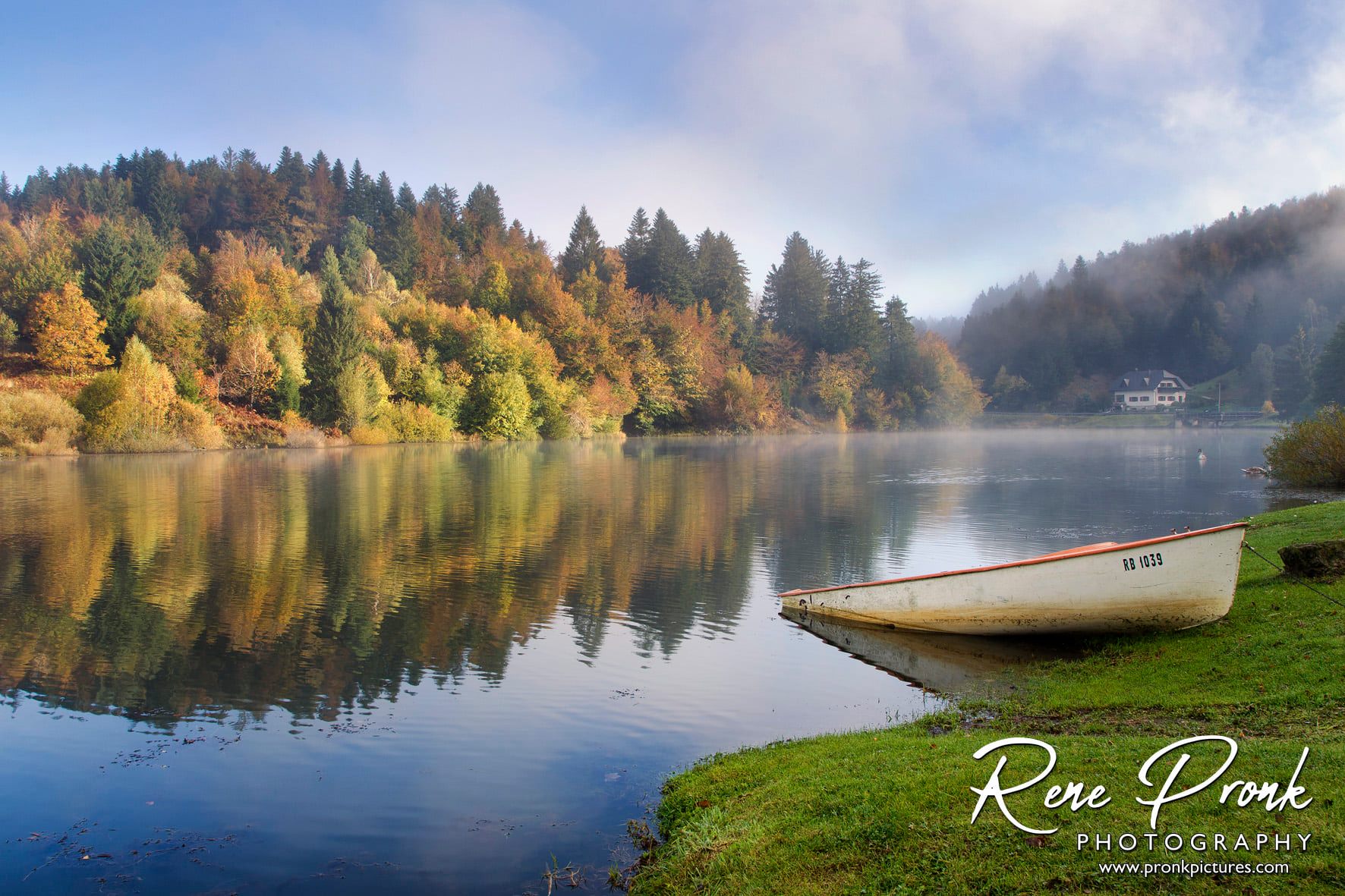
The majority of foreigners simply do not get even close to the true Croatian experience, and many are often surprised that so many young Croats are emigrating. It took me about 15 years living here until I fully grasped the true picture of the realities of living in Croatia. Which might seem a long time, but it probably not, and not that many foreigners stick around that long to figure things out. As I wrote a couple of years ago, there are 3 Stages of Learning for Foreigners in Croatia: Love, Hate & Nirvana.
The standard response to a foreigner talking positively about living in Croatia is almost always dismissive. It is easy to enjoy life in Croatia if you have millions, or there must be a suspicious reason why the foreigner has chosen to live here when all are emigrating - clearly they are running from something back home.
I am genuinely in awe of the creativity of all the theories I have read about my status here in Croatia, and the reasons for me moving here and deciding to stay. Apparently I am retired and independently weatlhy, was forced to leave the UK, and I run at least 8 of the major intelligence agencies including the CIA, FSB and Mossad.
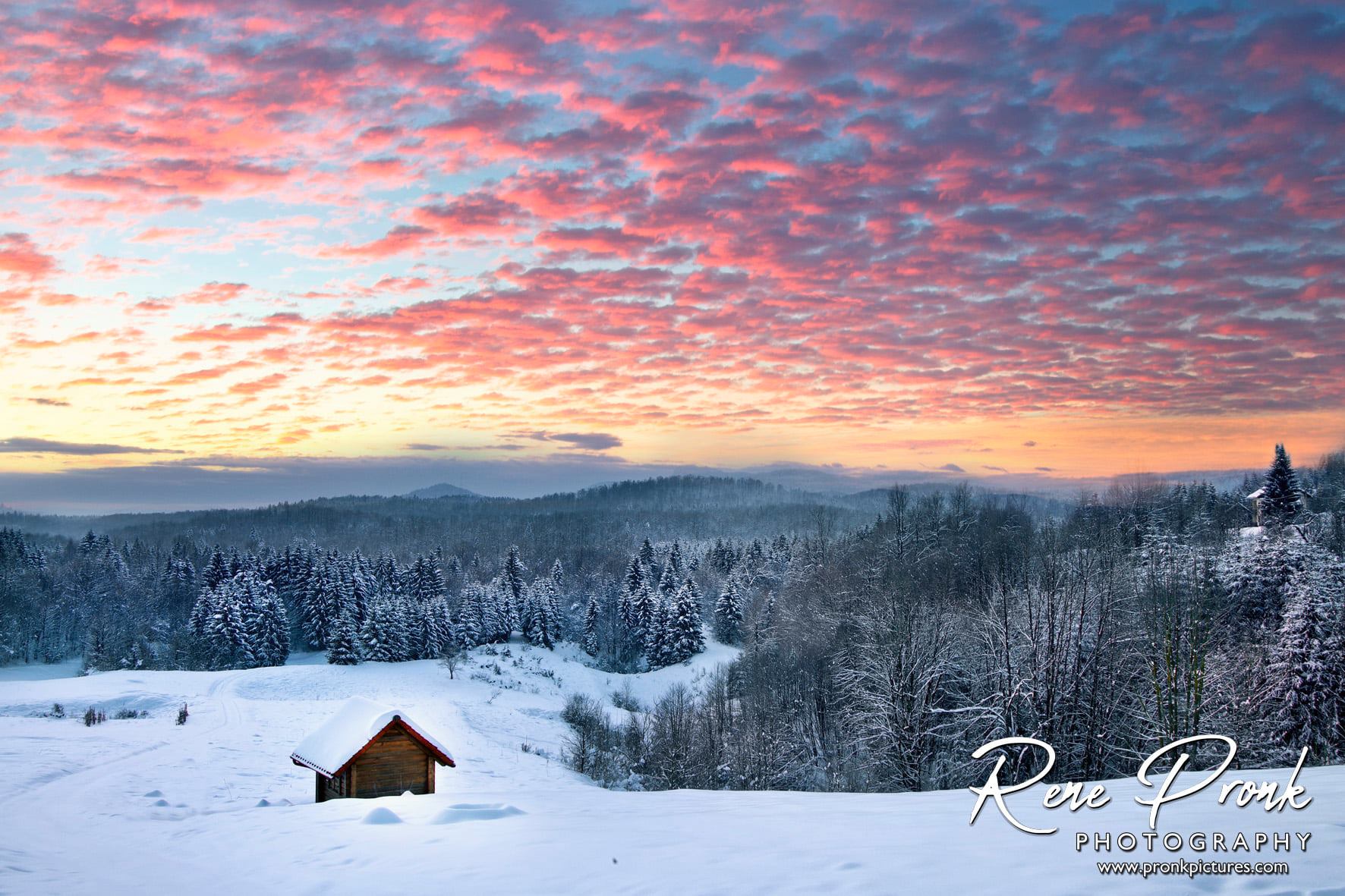
The possibility that I decided to leave my own country for a different experience, buy a house on one of the world's most beautiful islands as a base, then meet my future wife on that island and decide to live and work in a country with an incredible lifestyle, start my own business and work harder than I ever had before to support that lifestyle, is simply impossible.
For it doesn't fit the narrative many people have framed about living in Croatia.
A couple of days ago, I did an article about a Dutchman who has lived in rural Croatia for almost 8 years with his family. Although I have yet to meet Rene Pronk in person, he sounds like one of the most contented people in this country, and his article 20 Reasons Why Croatia is the Best Place for Living gave some insights into why he is such a happy man.
It didn't take long for the reaction to come.
Was Rene running away from something back home? Was he fabulously wealthy and could live independently forever? What were his suspicious motives for moving to Croatia?
I decided to ask him.
This was his reply.
During the civil war in Croatia I was able to visit the country a few times. At that time I was working for a humanitarian relief organisation and we organized regular transports of goods bound for Zagreb. That was way back in the early nineties.
It wasn't until 2003 that I had the possibility to go back to Croatia. I had purchased myself a small mobile home (caravan) and I decided to cruise the countryside of Slavonia. In expectancy of finding a campsite, I quickly got disillusioned. I ended up in a little village called Cigoc the European stork village. I was introduced to Bosnian families who fled the terror of war in their own land. They told me about their dream to build an old traditional wooden guest house. I helped them write their business plan and started to collect micro credits for this project. In 2008 the place called Tradicije Cigoc was opened and it became one of the first successful rural tourist attractions in continental Croatia. Ever since that time I fell in love with this country. In spite of all the problems with bureaucracy and some jealous people in that village, a dream was born in my heart.
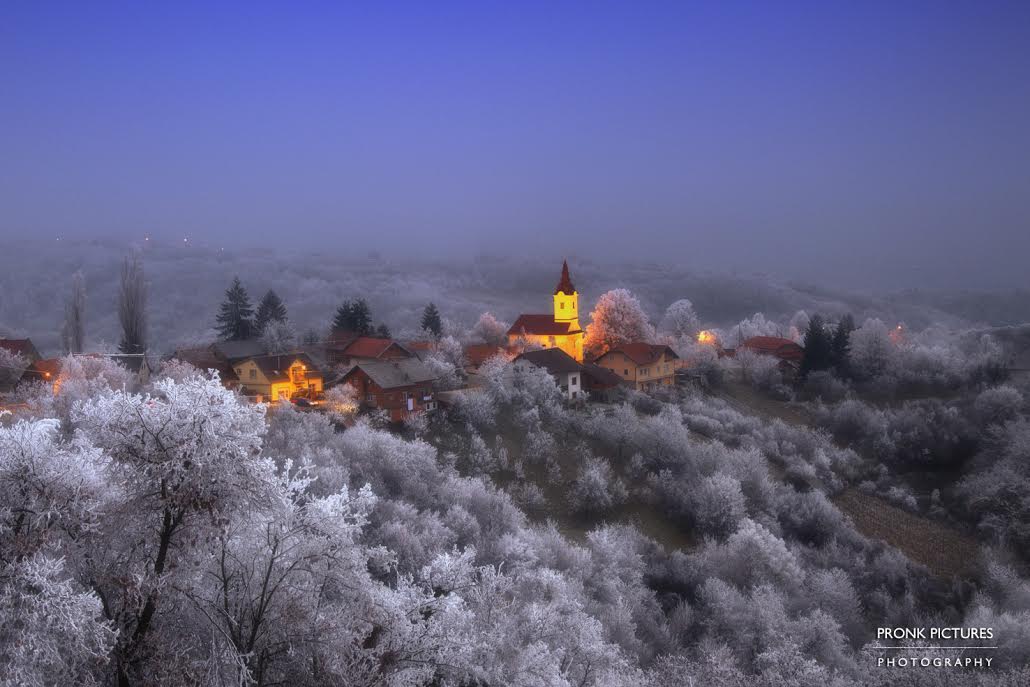
When I got married in 2011 with my wife Helga we started to talk about a future abroad. My wife lived in many countries all around the globe and has a degree in the Russian and German language. She works as a translator and an online teacher. I wanted to develop myself more and more as a photographer. My wife had a preference to move to Ukraine but a war broke out in 2012 so we decided we would move to Croatia. We both had savings and sold our house in Germany, where we lived in those days. We could live a couple of years from our reserves.
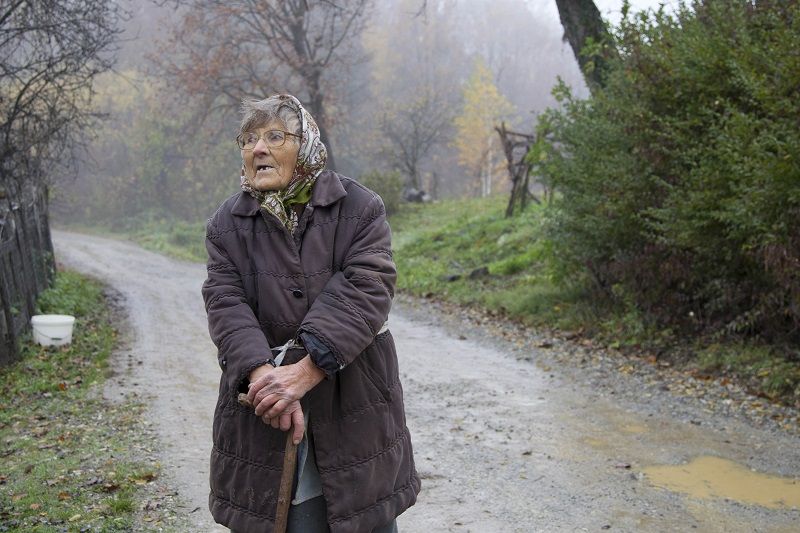
Our ambition has always been to provide for our own income. I started working as a photographer and my wife as a translator and teacher. We also tried a souvenir shop in Slunj and cooperate with several hotels and National Parks that sell my photo souvenirs. We also started a humanitarian relief foundation that is focused on helping the isolated elderly people in Croatia (you can read this TCN feature story from a few years ago - Who Helps Croatia's Lonely, Isolated Old People? Meet Proplan from Holland.
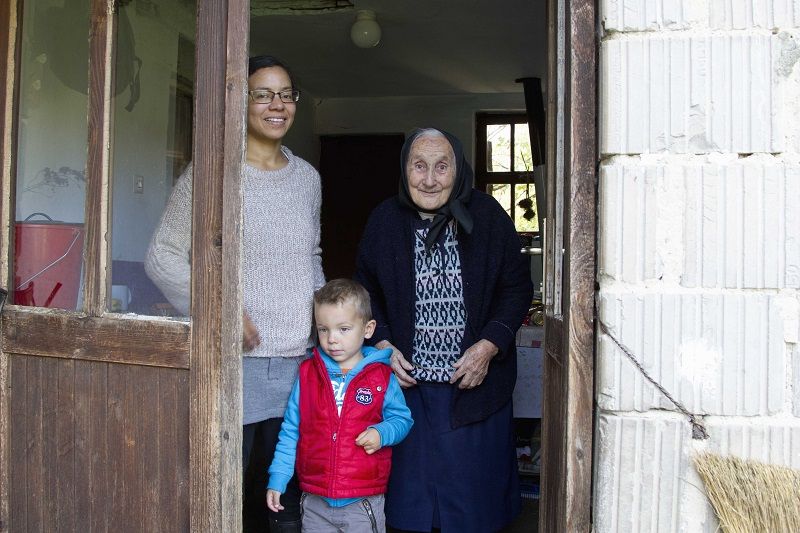
(Rene's wife and son visiting the isolated elderly in 2017)
We rent a holiday house in Samobor that we are now putting for sale. For four years we tried to develop a village tourism project in a lovely little village in the Zumberak Nature Park. Four years ago we came to the conclusion this would cost us another 20 years before all paperwork was realized so we sold that place and moved to Bosiljevo. Slowly but surely I am working here on accommodation for guests and a place for lectures and workshops.
This is where we live now and where I run my art gallery.
I know the common complaint of many Croats is that foreigner owns more money and for them, life is easier. I worked hard all my life and haven't slowed down. We earn less money than in Holland but have a much better and fulfilled life here. We came across many obstacles in this country and dealt with bureaucracy, jealousy and corruption. But we still love to live here. If you want I can write you how I deal with the negativity default in this country. There is a vaccine for the negativity virus and those who train themselves become immune for this virus.
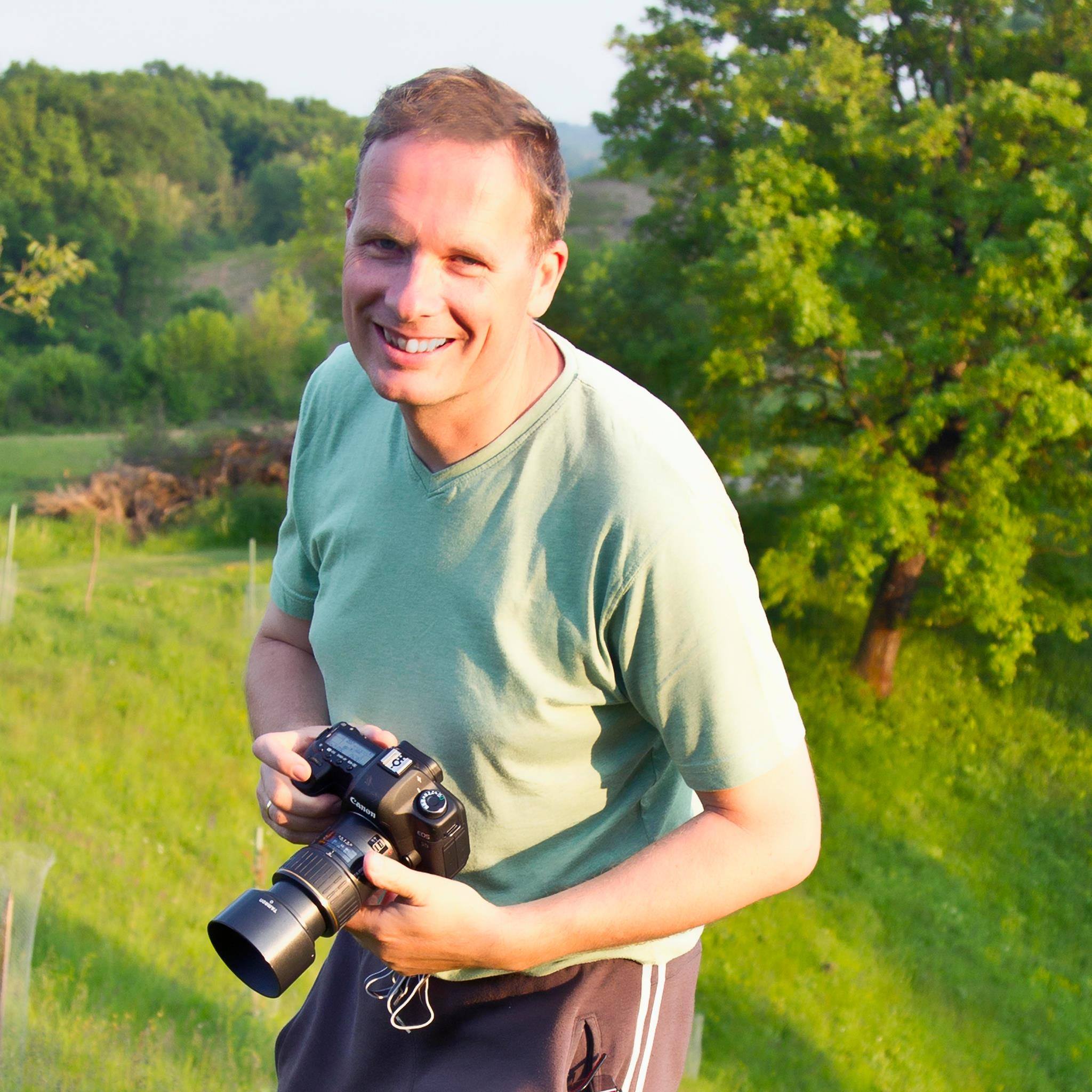
A vaccine against Croatian negativity, that sounds fantastic. As does living in Croatia, working hard with and for the community, and enjoying the fabulous Croatian lifestyle. It may sound impossible to believe, but I can confirm that - despite its MANY problems - living in Croatia, for all the reasons Rene described and more, really is better than most places. And if we could roll out Rene's vaccine and inject a little more positivity, it would be even better still.
You can learn more about Rene and his life here from this TCN interview a few years ago - From the Netherlands to Nature Park Žumberak: Meet Humanitarian and Photographer René Pronk.
You can learn more about Rene's work and offer on his Pronk Pictures website.
Injecting Positivity into the Default Negative Croatian Mindset
After 18 Years a Resident, 35 New Things I Learned about Croatia in 2020
December 18, 2020 - Living in Croatia is a continual process of education. Here are 35 things I learned about Croatia in 2020, having lived here already for 18 years.
At the end of last year, I was thinking about writing an article to summarise the year on TCN. While looking back on the year and my various travels all over the country, I was struck by how many new discoveries I had made in 2019, despite having lived here for 17 years. Every day is different, and Croatia is able to produce unlimted interesting experiences 12 months a year. In the end, I decided to settle on an article called Why I Live in Croatia: 30 Incredible Discoveries in 2019 Alone.
I was pleased with the article and made a note to repeat it every year, and I looked forward to seeing what treasures Croatia in 2020 would bring.
2020 brought corona, and so limited was my travel during lockdown on Hvar that Google Maps told me that in April I walked 100 kilometres and drove just 65 kilometres. I don't think I have ever walked 50% more in a month than I have driven since passing my driving test over 30 years ago.
With much less to explore this year, I decided to focus on what I had learned about Croatia in 2020. It turns out that I learned quite a lot. Here are my top 35 things.

1. The only foreigners at a Croatian Presidential inauguration
The first major lesson of the year (where to stand at a presidential inauguration) came at the inauguration of President Zoran Milanovic in February, as my phone started going crazy with messages. They were all sending me images of myself standing like a lemon behind the armed guard on national television.
In my defence, it was my first (and, on this performance, probably my last) presidential inauguration, and President Trump need not fear that Milanovic would draw a bigger crowd than him. Just 39 invited guests. It was a very low-key affair overall, made memorable by THAT rendition of the national anthem by Josipa Lisac (listen above).
Newly crowned President Zoki didn't want a lot of fuss, and it was all over within the hour, with the media packed into a room next door where they watched the event on television. Which kind of defeated the point of reporting on it live. This was the fond farewell to outgoing President, Kolinda Grabara Kitarovic, after which he went inside and the show was presumably over. Along with my Croatian-American colleague, we were the only foreigners at the inauguration. A curious affair from start to finish. Read more in A Foreign Eye Behind the Scenes at Croatian President Milanovic Inauguration.
2. The Croatian Government sometimes DOES keep its promises, even if it takes 250 years
One of the most educational things this year was our partnership with the Ludbreg Tourist Board, a short drive from my home in Varazdin. On the surface, Ludbreg looks like any other northern Croatian town, but the more you look, the most unusual the stories. How about this one, for example. a tale of the Croatian government delivering on a promise more than 250 years after it was made. As you can see in our One Minute Ludbreg video, back in 1739, with the plague ravaging the country, the Croatian Parliament in the then capital, Varazdin, made a vow to build a church of thanks in the miracle town of Ludbreg (of which more below) if God would stop the plague. God duly obliged and the plague stopped, upon which the Croatian government did... nothing. At least until more than 250 years later in 1994 - during the Homeland War - when the Sanctuary of the Precious Blood of Christ was built.
3. Watching the authorities take total control with just a few instructions
March was a crazy month for us all in Croatia, as we went from a relaxed country enjoying the chilled Croatian lifestyle to almost complete lockdown almost overnight. Residents of Zagreb and surrounding areas had to deal with the additional horrors of the March 22 earthquakes. Croatia's initial response was outstanding, and it was both terrifying and admirable to see how the Croatian police got everyone organised and into line by introducing and enforcing their contingency plan.
Seemingly overnight, we were confined to the towns and villages we were registered at, with no onward travel allowed without a special permit. Everyone obeyed without question. If they had taken away our phones, Internet and television too, we would have been back in the Middle Ages. It was part of a highly effective initial response by the Croatian response. Watching my video report at the launch of R+, above, takes me back seemingly years. But it was only a few months ago - 2020 has aged us all and made time take longer.
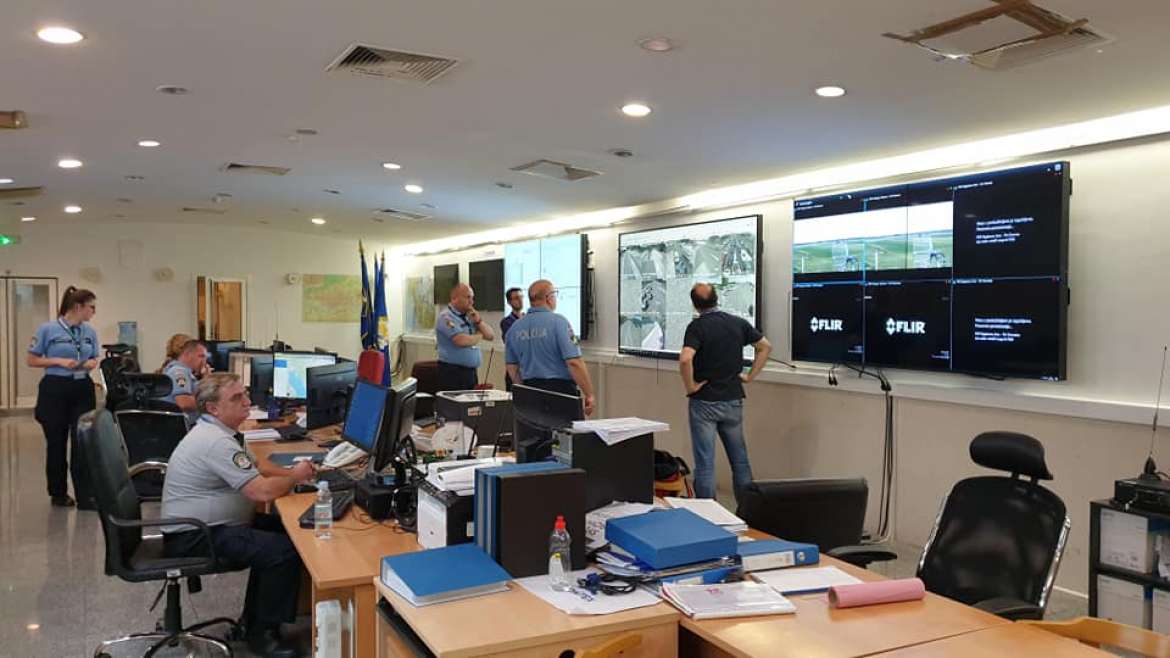
4. The Croatian border control centre - is this really Croatia?
A few months later, I got to see the inside story of just why the Croatian police run such an efficient system - behind the scenes at the Croatian border police centre.
Outstanding! Read all about it in A Foreign Eye Behind the Scenes at Croatian President Milanovic Inauguration.
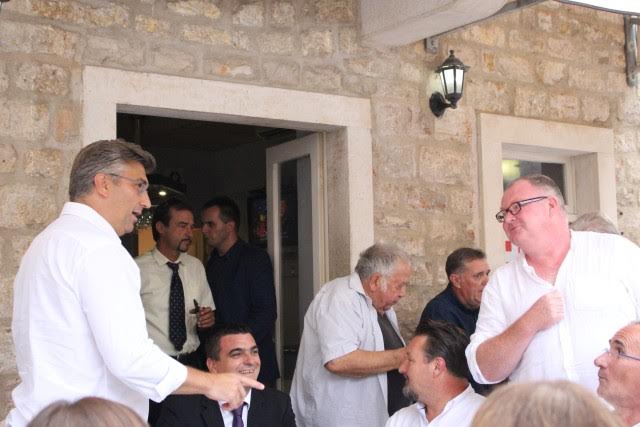
(Photo Vivian Grisogono)
5. Bureaucracy can work - the open letter to Prime Minister approach
2020 was the year that I learned that writing an open letter to the Prime Minister DOES work, at least if you are Dutch.
I tried it a couple of years ago, which resulted in PM Plenkovic asking me over for a chat then promising not to sue me.
But, as regular followers of TCN will know, Dutchman Jan de Jong had considerably more success when he sent Plenkovic an open letter on LinkedIn - you can follow the progress of Croatia's digital nomad visa here.
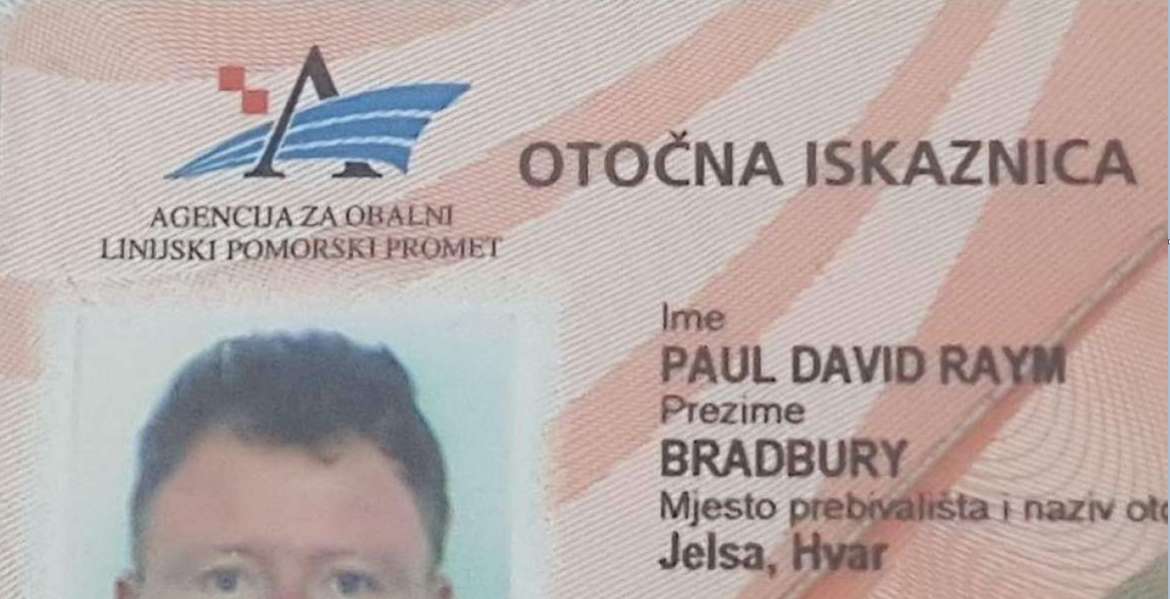
6. The 18-minute driving licence change, as Croatia ends its bureaucratic discrimination against long names
Since swapping the laganini lifestyle of Dalmatia for a new home where people work 12 months a year in Varazdin, I have come to believe in the potential of efficient bureaucracy in the Croatian context. it all started after MUP Varazdin restored my (admittedly absurd) full name to its former glory. After years of feeling emasculated as merely Paul David Raym Bradbury, due to the lack of space on the ID card for names, the heroes at MUP Varazdin made me feel whole again when they gave me a new ID in the name of Paul David Raymond Bradbury. More in Progress in Absurdistan: Longer Names are Now Possible on ID Cards. They then followed this up by changing my UK driving licence to a Croatian one in just 18 minutes - the total amount of my life I have had to dedicated to Brexit paperwork. MUP Varazdin: Celebrating Croatian Bureaucratic Excellence - Yes, Really!
7. A responsive Ministry of Tourism moves on from the era of the fax machine
Inspired by this Varazdin efficiency, I wondered how I could help with improvements elsewhere in the system. A few suggestions in An Ode to the Fax, the Digital Champion of Uhljebistan 2.0 apparently led to the abolition of the fax machine at the Ministry of Tourism, for which was the Croatian media was kind enough to give me a little credit. A useful lesson - when I find the time, I will be happy to make similar suggestions for such a responsive ministry.
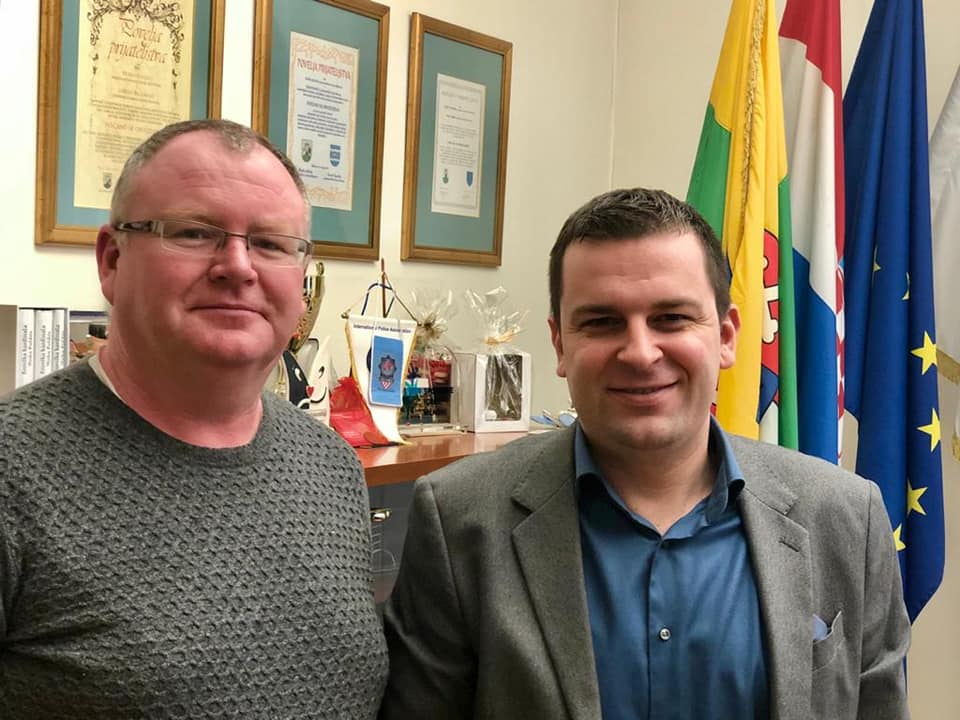
8. A visit to not one, but two corruption-free towns in Croatia
And the thing is, things ARE changing in Croatia. My first visit to Bjelovar to meet innovative mayor, Dario Hrebak - I certainly didn't expect to come home with a headline like Seeds of Change: My City is Corruption-Free, Claims Croatian Mayor. My transparency education took me further, to perhaps the biggest discovery of the year - Sveta Nedelja. Not only the most transparent administration in all Croatia, but also a town with population growth of 10% since the 2011 census, 20% more jobs since 2017, unemployment of just 3.9%, and named best medium-sized town for the economy three years in a row and in the top 5 for quality of life. Oh yes, and free buses for all. Follow the amazing Sveta Nedelja story here.
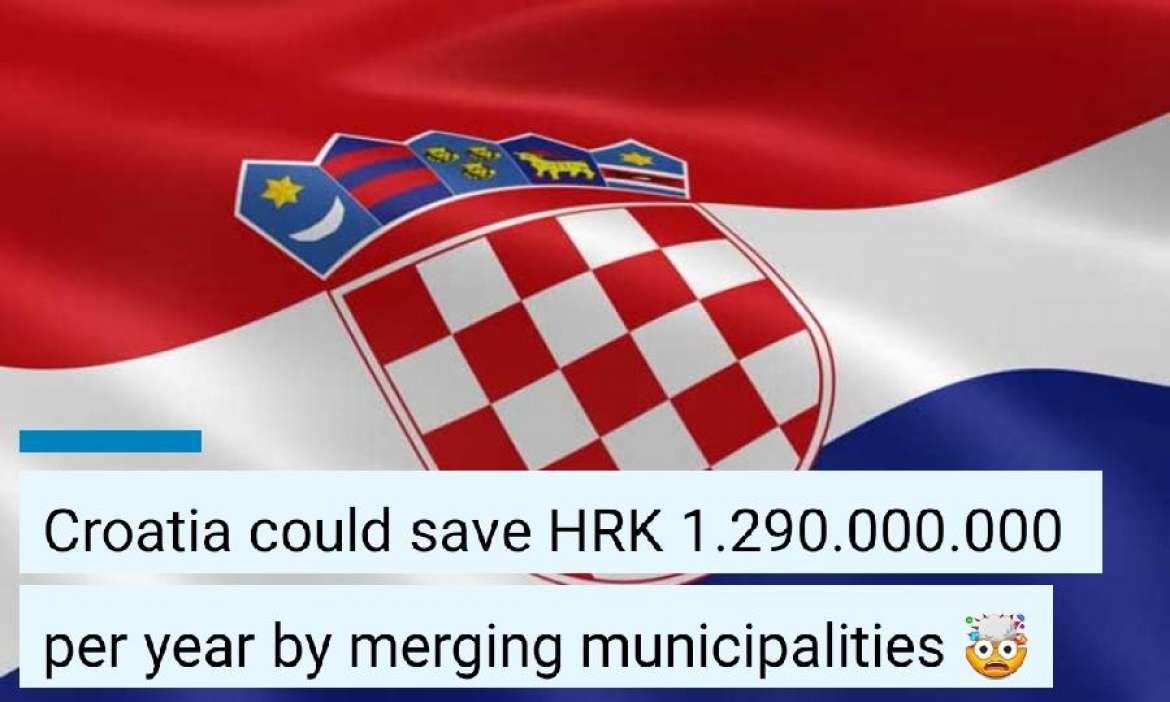
9. 1.29 billion bureaucratic reasons to listen to Big Data
All this talk of bureaucratic efficiency is fine, but is there any concrete plan? One of the great driving forces for change that emerged in 2020 was Glas Poduzetnika (Voice of Entrepreneurs). Included in their calls for a better approach were some really interesting results powered by Big Data - Big Data Shows Merging Municipalities Could Save Croatia 1.29 Billion Kuna a Year.
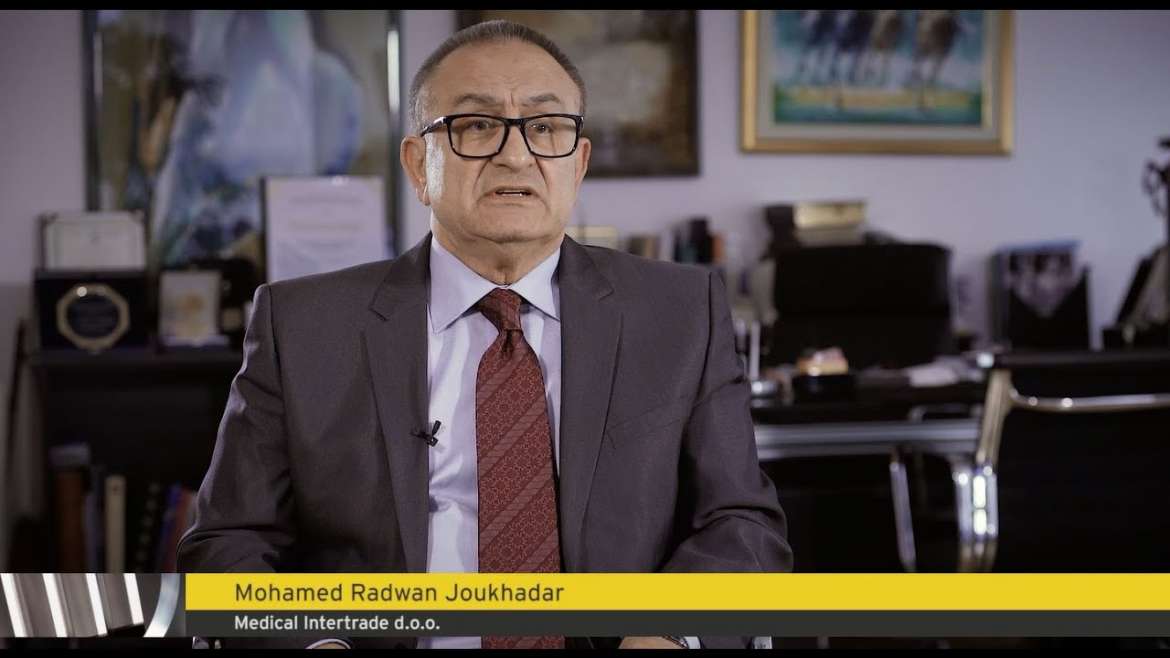
10. Mate Rimac is not the biggest player in Sveta Nedelja
I learned that the incredible Rimac Automobili, despite its fabulous growth and success, is actually not even the biggest company in that miracle town of Sveta Nedelja. That accolade goes to a Syrian immigrant, who came here to study back in 1968, and whose main business turned over more than 250 million euro last year, employing 829 people. Fantastic story - Meet Sveta Nedelja's Biggest Company, a Success Story Born in Syria.

11. Need to call an election, who you gonna call? Oraclum
2020 was the year when I finally had the chance to catch up with - and learn a lot from - one of Croatia's brightest minds, the Wolf of Oxford, Vuk Vukovic. Along with two other Croats, his Oraclum company was the only pollster in the world that correctly forecast Brexit, Trump 2016 and a narrow Biden 2020. Fascinating stuff.
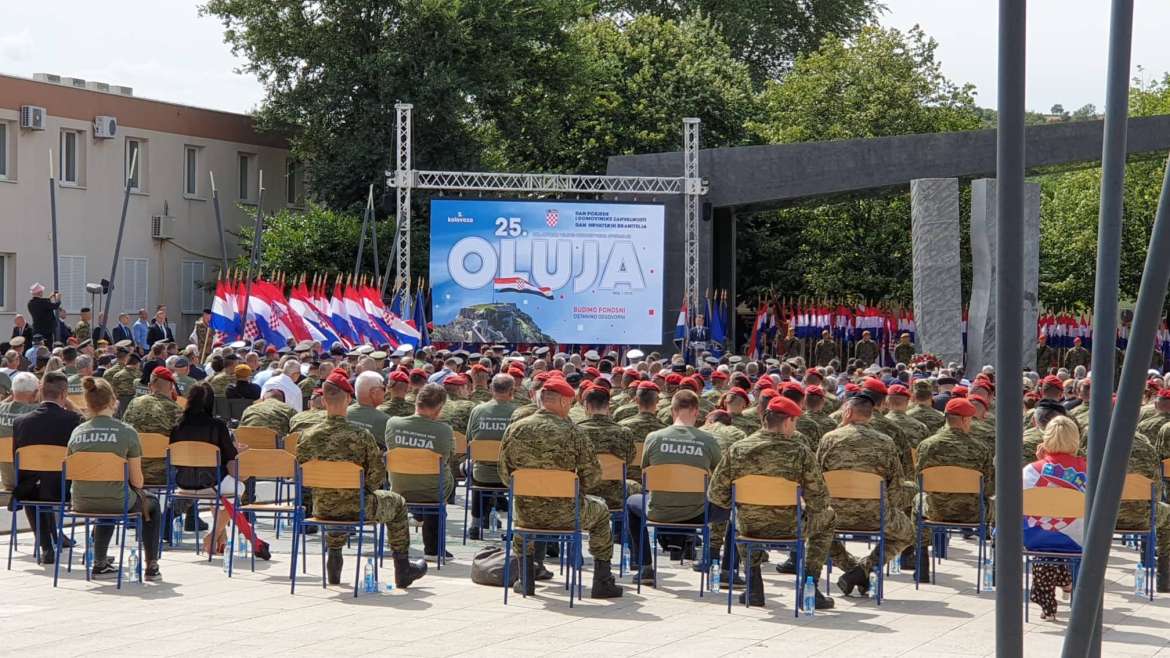
12. Attending Oluja 2020, an emotional and educational day
One of the most educational - and emotional - days of the year was Oluja 2020 - the 25th anniversary of Operation Storm. It is a topic I have always shied away from writing about, but I decided that the best way to cover it was to experience it in the flesh. It was a draining but rewarding day, allowing me one more level of comprehension of this beautiful but complex country. Operation Storm: Foreign Reflections on a Visit to Oluja 2020 in Knin.
13. AI conferencing - what I learned about Croatian AI strategy
2020 saw me attending far less conferences than in previous years due to the pandemic, but the few I did attend were thought-provoking indeed. None more so than the AI conference organised by Cro AI, in which the AI strategies of Israel, Sweden and Croatia were presented. Let me rephrase that. The strategies of Israel and Sweden were presented in the presence of the Croatian State Secretary of the Economy. I might not have known much about AI and Croatia's strategy, but it seems I was not alone, as I found out when I asked a question after the presentations, above.

14. A Croatian was designing Croatian seaplanes almost 100 years before European Coastal Airlines
Back to Ludbreg again, where I noticed a monument to an aeroplane near the mayor's office. I asked TCN's recent graduate Donatella Paukovic to investigate, and she came up with quite the story - seaplanes, designed in Croatia! In the 1920s! Rudolf Fizir, Great Croatian Aircraft Designer, Wanted to Connect Adriatic Islands with Seaplanes.
15. A simple method from a Croatian professor to remove 20% of annual global carbon emissions
Just as I had not come across aviation genius Rudolf Fizir from Ludbreg before, I had also never heard of Professor Stasa Puskaric until this week. This despite the fact that he appeared with one of the climate change solutions on Leonardo DiCaprio's Ice on Fire documentary last year. He has quite an incredible plan. Marine Snow, a Croatian Solution to Remove 20% of Global Annual CO2 Emissions.
16. Technology for the new normal, born in China, developed in Varazdin
It was supposed to be a social chat over a beer with my web design company watching NK Varazdin train, but it quickly developed into a rather interesting opportunity in the fight against corona. A few days later, the team from Exabyte doo and I had swapped the NK Varazdin training ground for the exclusive waterfront of Hvar Town. Hvar Tests Rapid Temperature Check Tech from Varazdin in Corona Fight.
17. An introduction to online schooling
The pandemic necessitated a big rethink in all aspects of life, including education. Online schooling became a reality for all, a period of adjustment for all of us. The girls managed superbly with the adjustment and even became media stars discussing the pros and cons. If online schooling were here to stay, they would be very happy. Video above by Miranda Milicic Bradbury.
18. Professor Igor Rudan can write a lot
Another name (to my great shame) that I had never come across before 2020 was Professor Igor Rudan. His texts earlier this year were a lifesaver, as we all struggled to understand what this virus was all about. His explanation of what happened in Italy is a text which was a masterclass. And boy, that boy knows how to pump out the words, as TCN editor Lauren found out when she started translating his work. We were very honoured with Igor insisted that the translations were published in English first on TCN. Thank you, Sir! You can read Igor's texts here.
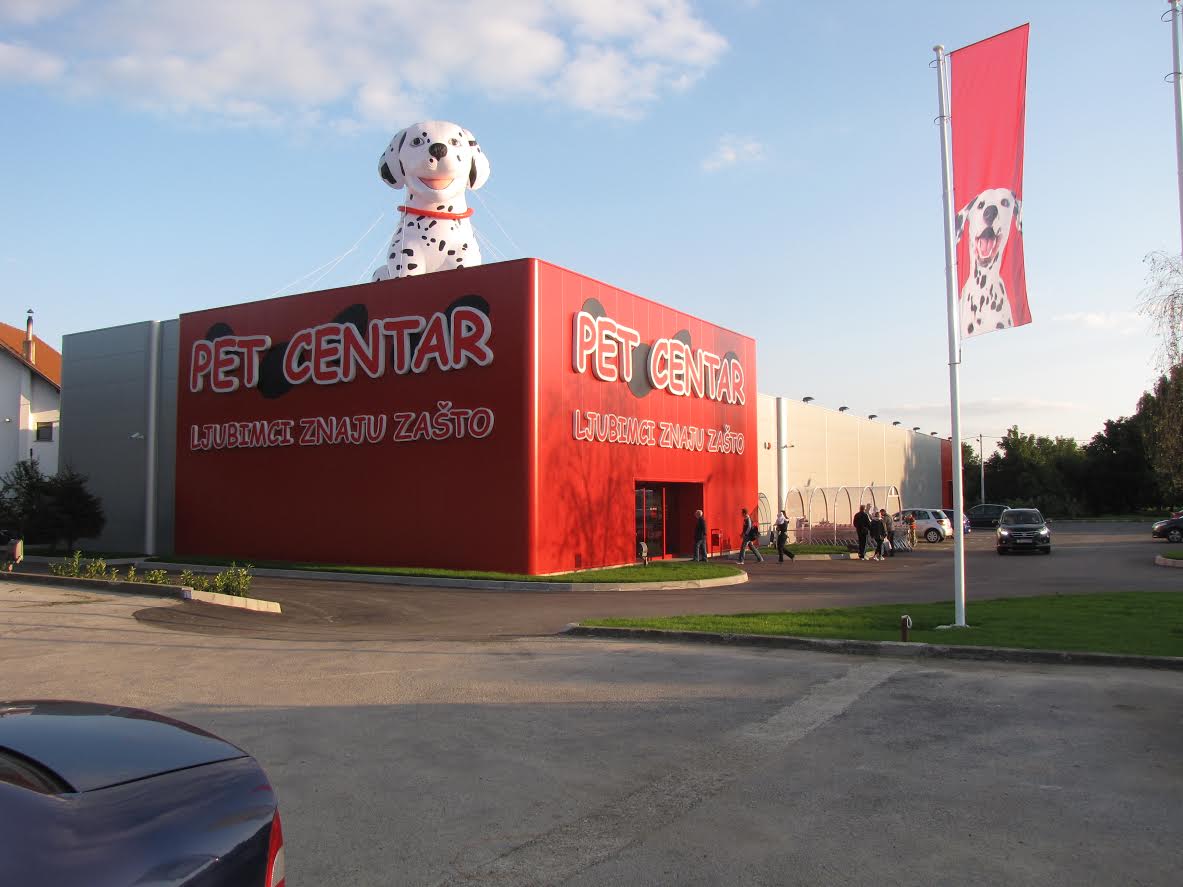
19. Heroes of the lockdown - Pet centar
I have never had a pet, and so the supply of pet food during the pandemic was not something that concerned me until an expat friend asked for some help with supplies. As luck would have it, I was invited to do an interview with the owner of Pet centar - what an amazing service being offered all over Croatia during the lockdown.
20. IRIM and the next generation - Google.org's first partnership in Croatia
Nenad Bakic, one of the Financial Times 2018 top 100 digital champions in Europe, and his wife Rujana have been doing incredible work building the digital skills of the younger generation through their IRIM and Croatian Makers project. The first Croatian project ever to win funding from Google.org, IRIM then qualified for second-phase funding from Google.org earlier this year, as they pressed ahead with efforts to digitise Croatian (and regional) libraries. Check out my interview with Rujana above (filmed by Gustavo Vilera), and learn more in Rujana Bakic on Croatian Digital Citizen 2.0, Empowering Libraries.
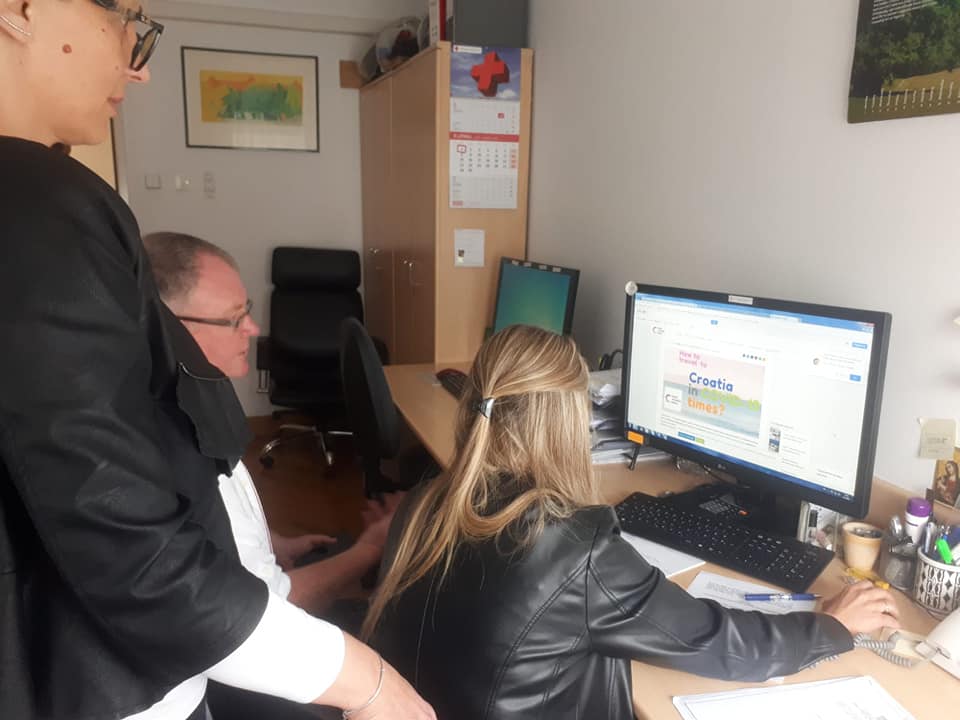
21. Official tourism representation in the Kingdom of Accidental Tourism 2020, where the police answer the emails
From using an image of a beach in Mozambique to promote Makarska to claiming Jelsa has two airports, it was another memorable year of unique promotion from our official tourism gurus. The big discovery of the year was that it was actually the Croatian police who were answering the bulk of the emails this year, this despite Croatia having a national tourist board, 20 regional tourist boards, 319 local tourist boards, a ministry of tourism, and a dedicated tourism section in the Chamber of Economy. It was a pleasure to meet the police staff who were doing all the work, and I was more than happy to make TCN's resources and research available to them, above.
The tourism chiefs must have had a very busy year with no events and few tourists, as very few had the time to show any interest in our free promotional offer. Those who did respond seemed to appreciate their Virtual Croatia article on TCN.
22. Croatia has only one authenticated miracle, and most Croatians cannot name it
One of the ironies of life here is that Medjugorje in Hercegovina has over one million pilgrims a year to visit a phenomenon which has not been recognised by the Vatican, while Croatia has an authenticated miracle which not that many people know about. I had known about the Eucharistic Miracle of Ludbreg for some time, but only recently figured out that it is in fact the only authenticated miracle in all Croatia.
23. Za Krizen 2020, when 500 years of UNESCO tradition meets a global pandemic
There are no prizes for guessing my most unusual night of the year - Za Krizen, the UNESCO procession on Hvar which has taken place every year for more than 500 years. The procession did eventually go ahead in the middle of the lockdown, albeit with a much-reduced presence. It was a very controversial decision, and I think I am right in saying it was the only public event which took place in the whole country for the month of April. Due to the lockdown, I was one of only two journalists who covered the event. I was there through the night, and I learned just how different the realities on the ground could be misrepresented by the media. One of the most absorbing and unusual nights in my 18 years in Croatia. Jelsa Za Krizen, Croatia Not Wuhan & Cabin Fever Perspectives.
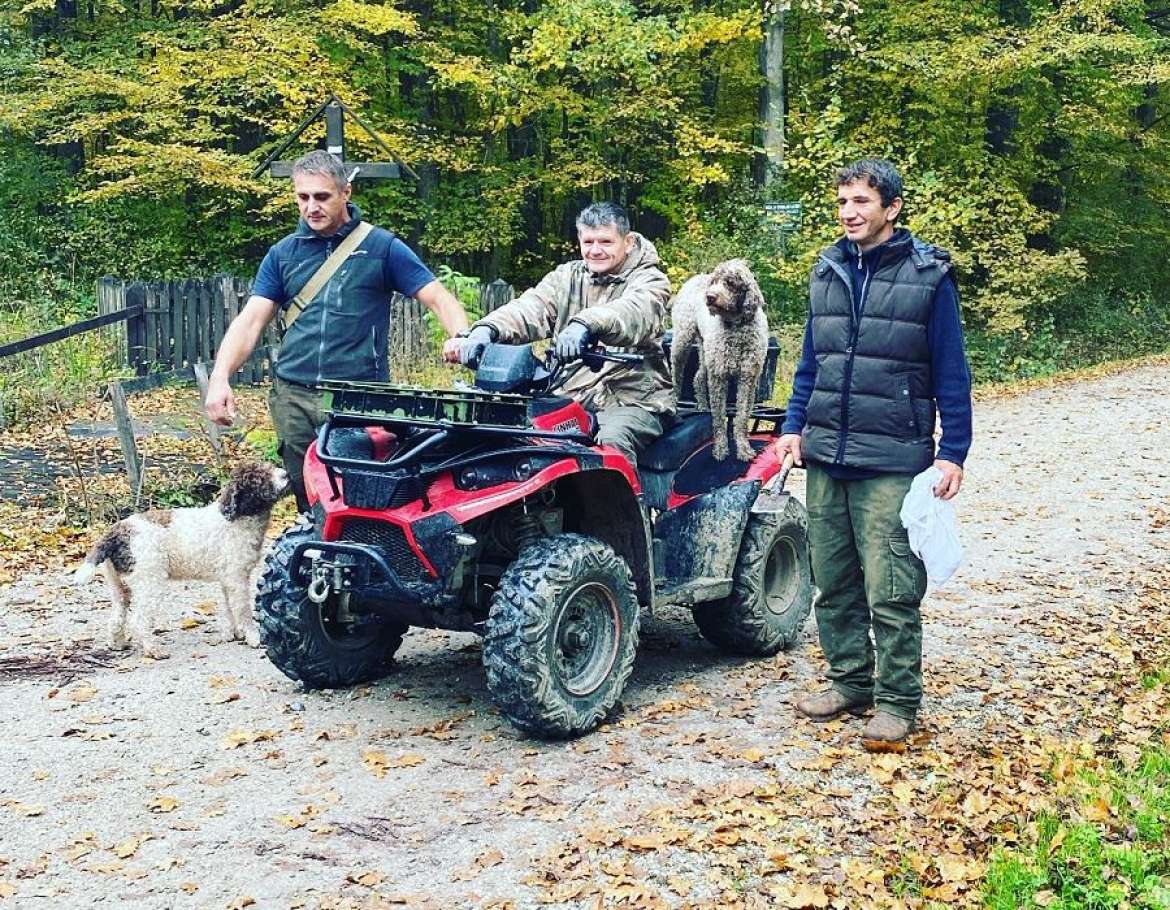
24. Truffles are not only for Istria - some discoveries near Zagreb and Split
Did you know that you can go truffle hunting close to Zagreb airport? Or just outside Split? Or that many of the Zagreb truffles get sold in Istria, some of them back to restaurants in Zagreb? Or that strukli with truffles is delicious? Start your Zagreb truffle education here.
25. Quarantine heritage - Croatia has an island called Leper
I knew all about Croatia's quarantine heritage with the Republic of Dubrovnik being the birthplace in Cavtat in 1377.
But did you know that Croatia has an island near Korcula called Leper? Check out the beauty of Gubavac in yet one more stunning video from Outdoors Croatia.
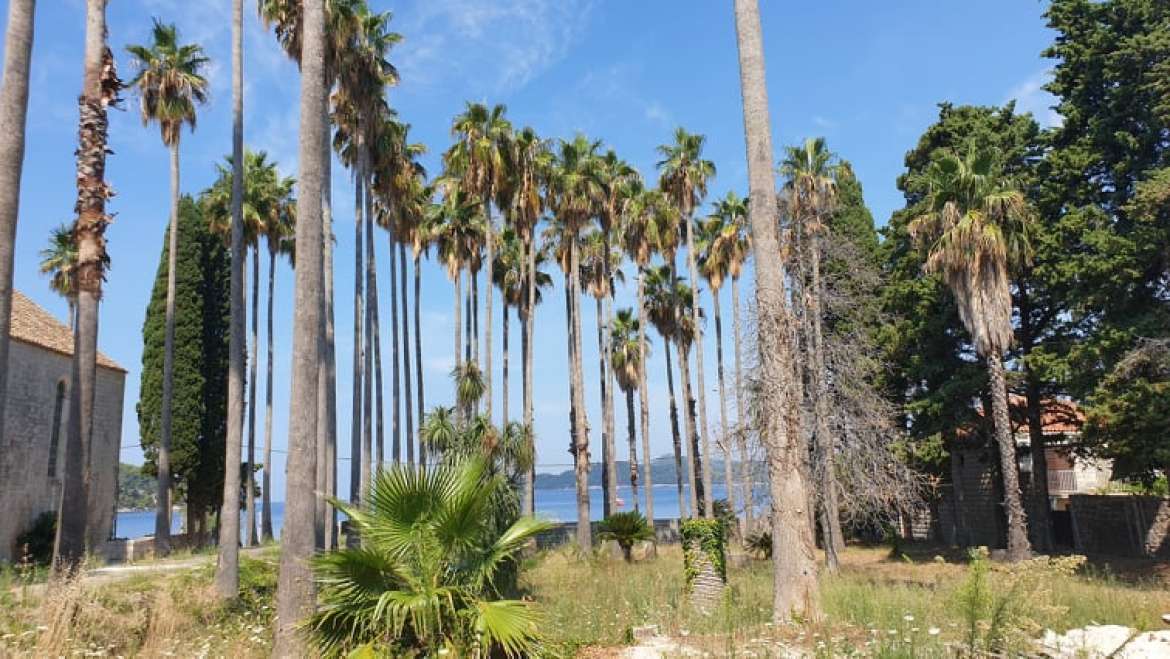
26. Europe's first concrete hotel and tallest palm trees - and more secrets from the Elaphiti islands
What little travel to new corners of Croatia I did was in the south around Dubrovnik area. I had my first - and very overdue - trip to the Elaphiti islands, Kolocep, Lopud and Sipan. Magical all, but Lopud shades it as the best of the three, and with the most surprises - Secrets of Lopud: Europe's Tallest Palm Trees Shade Europe's Oldest Concrete Hotel. With thanks to Lopud guide par excellence, Kresimir Macan.
27. A European restoration winner - St Martins Church in Stari Brod
Back to Ludbreg again... On the upper floors of Batthyany Castle is the Ludbreg Restoration Centre, one of the leading art restoration centres in Europe. You can check out the restoration centre in the One Minute Ludbreg video above, including the spectacular St Martins Church in Stari Brod, which earned the centre a prestigious restoration award, as well as a place on my 2021 bucket list.
28. Scenic Eclipse, built in Croatia with Dame Helen Mirren as godmother
Did you know that Dame Helen Mirren is the godmother of the last ship ever to be built in Uljanik in Pula? Or that the 200 million euro Scenic Eclipse is leading the way in a new category of luxury tourism - the polar discovery luxury cruise ship. Or that the Australian owners were so impressed by the skilled Croatian labour that they have ordered five more ships to be built in Rijeka. Take a tour of Scenic Eclipse here.
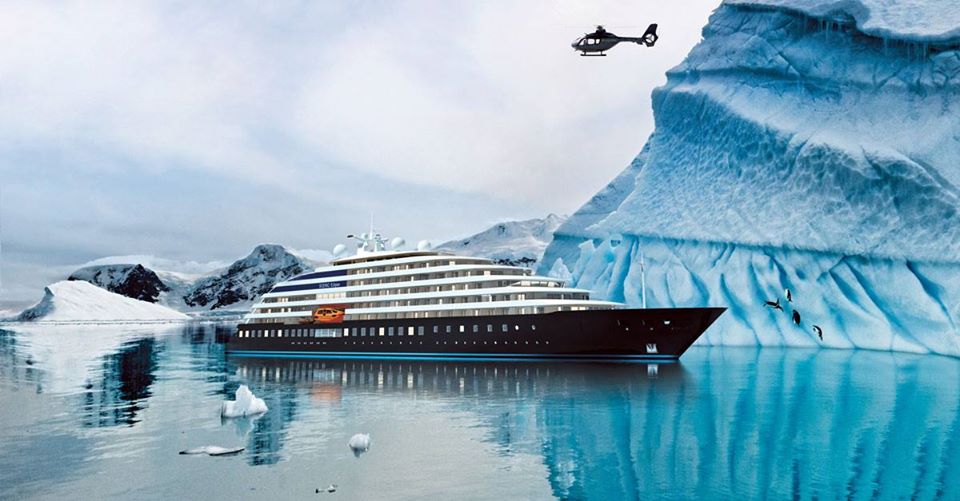
29. Metal detecting tours in eastern Croatia
One of the more dubious discoveries of 2019 was a dour Yorkshireman called Steve, who had an English pub literally in the middle of nowhere in eastern Croatia. A war veteran volunteer, Steve Gaunt stayed in Vinkovci after the war, found a local lady to take pity on him, and proceeded to accomplish some rather unique things. Such as the introduction of the Yorkshire pudding to the menu in a Vinkovci restaurant, the placing of a red London telephone box in the middle of Vinkovci, and some rather impressive metal detecting work. A little hobby which he shares with others with a novel type of tourism - metal detecting tours.
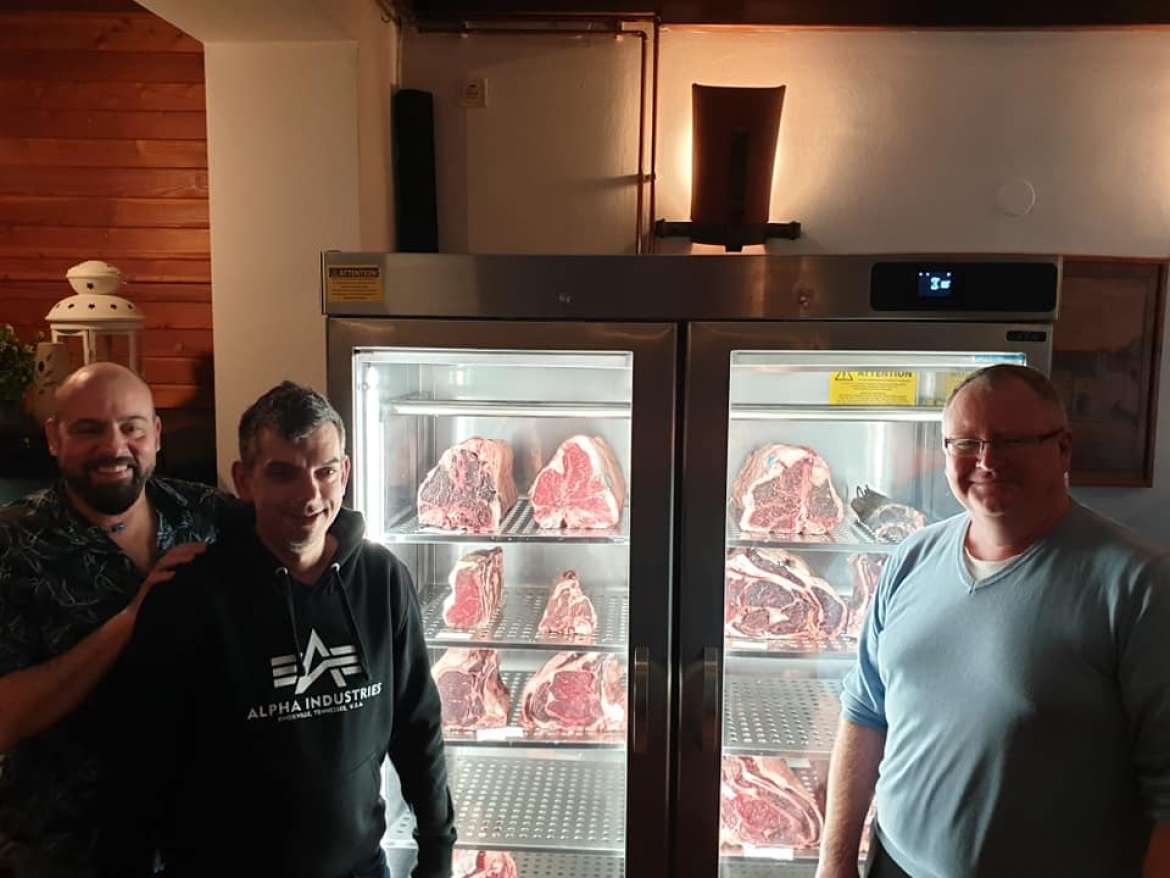
30. Free-range wagyu beef comes to Croatia
By far the craziest man I have spent time with this year is Nikola Bozic, the charismatic and visionary owner of Djurina Hiza in Varazdinske Toplice. An afternoon with Nikola is an education in itself. The year started with dinner at Hiza with Nikola and Ribafish, testing the new dry-aged collection, and things quickly escalated. Nikola beat the lockdown by hiring more staff as other restaurants closed. He changed his business model to online delivery, and soon he was covering the entire country with his excellent dry-aged steak deliveries.
Soon after the borders opened, I somehow found myself in his passenger seat on a trip to Brussels via Munich and Luxemburg, as he took his luxury Croatian products delivery concept internationally. There was even time to check out an excellent Istrian restaurant in Brussels. You can hardly find an Istrian restaurant in Croatia outside of Istria, but if you go to Belgium...
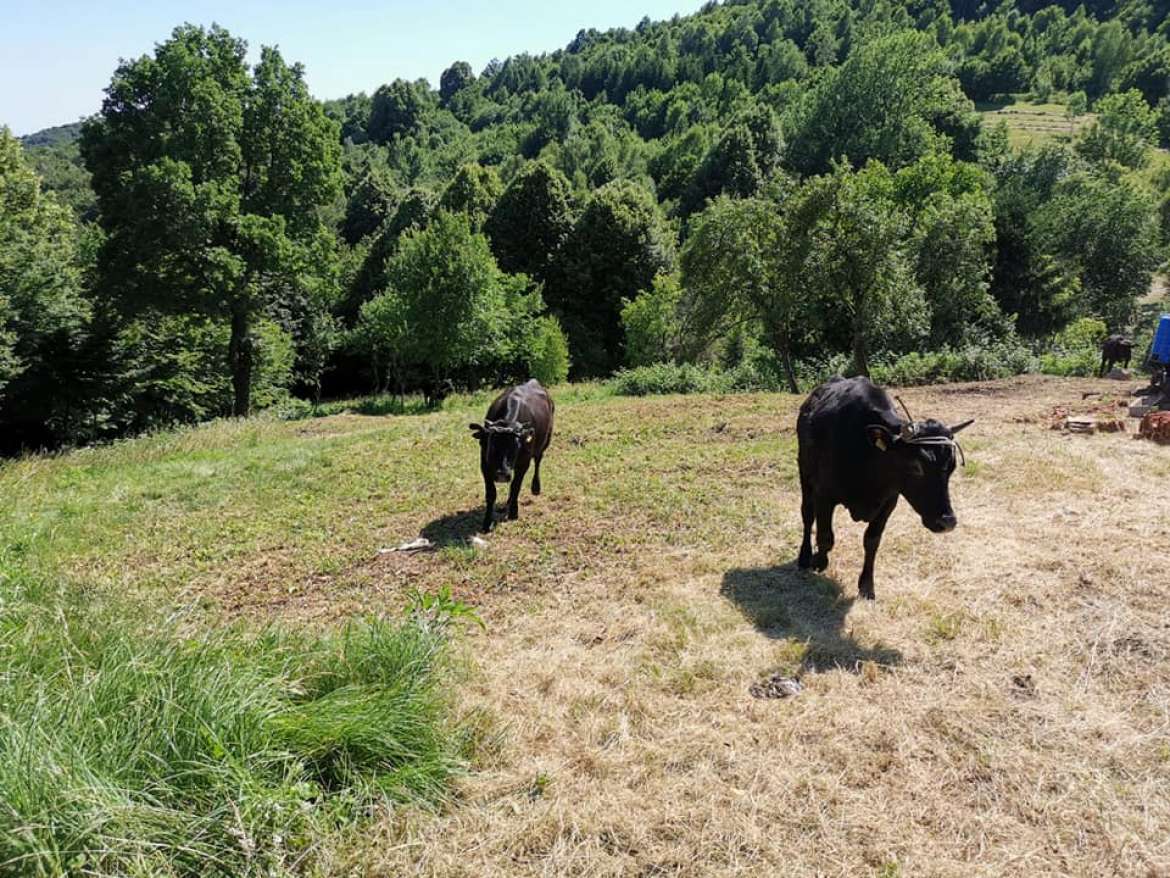
But the most interesting day was helping Nikola with one of his most ambitious projects - to introduce the first free-range wagyu beef cows in Croatia. It was quite a day bringing four black Japanese inhabitants to an abandoned village, the first cows in that part of Zumberak Nature Park in over 40 years. Medjimurje to Zumberak: Transporting Croatia's 1st Free-Range Wagyu Cows.
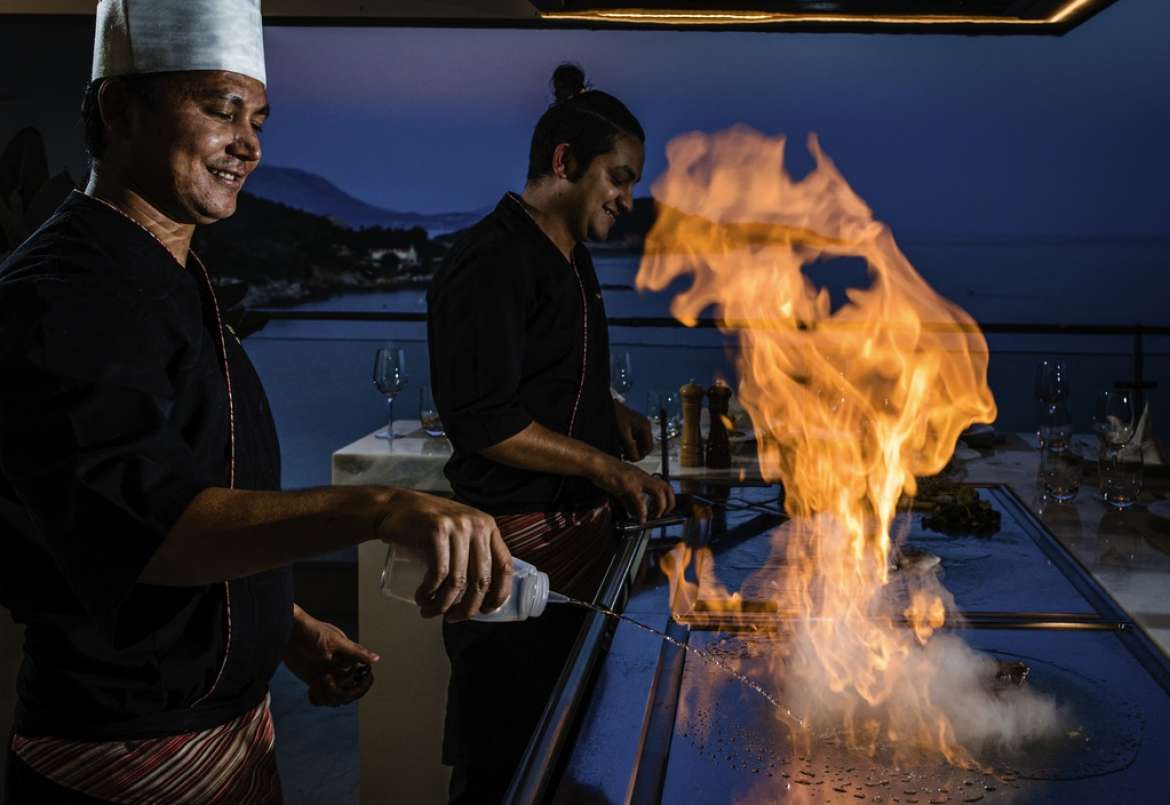
31. Umi Teppanyaki at Rixos Dubrovnik
But for the culinary spectacle of the year, head to Rixos Dubrovnik and book a ringside seat by this man - Umi Teppanyaki at Rixos Dubrovnik, Where Gourmet Art & Entertainment Combine.
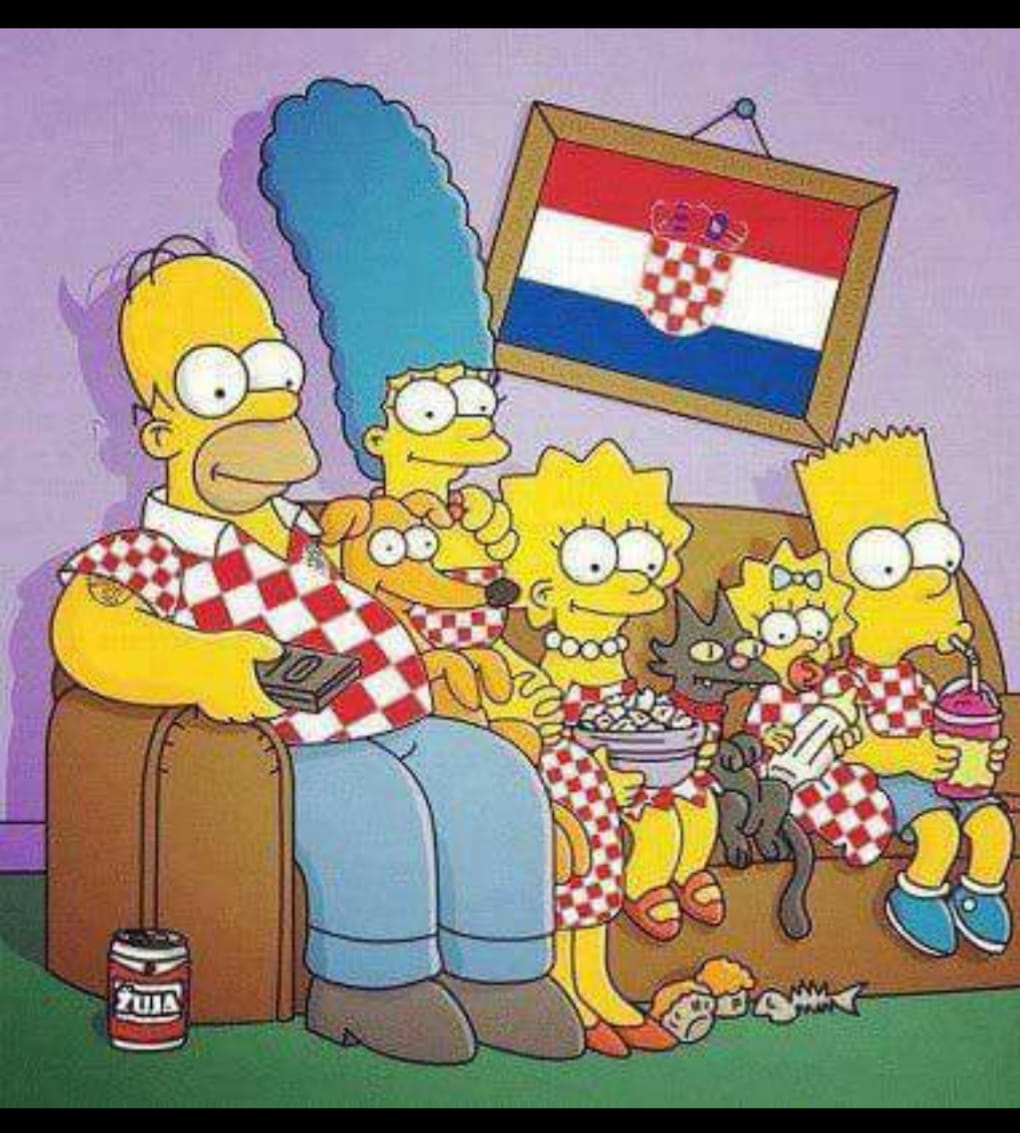
32. Homer drinks Zuja
I have written over 9,000 articles about the island of Hvar in the last 10 years. And I really thought I had covered everything. But then came along the Vrboska Homer Simpson connection. Did you know that Homer drinks Zuja?
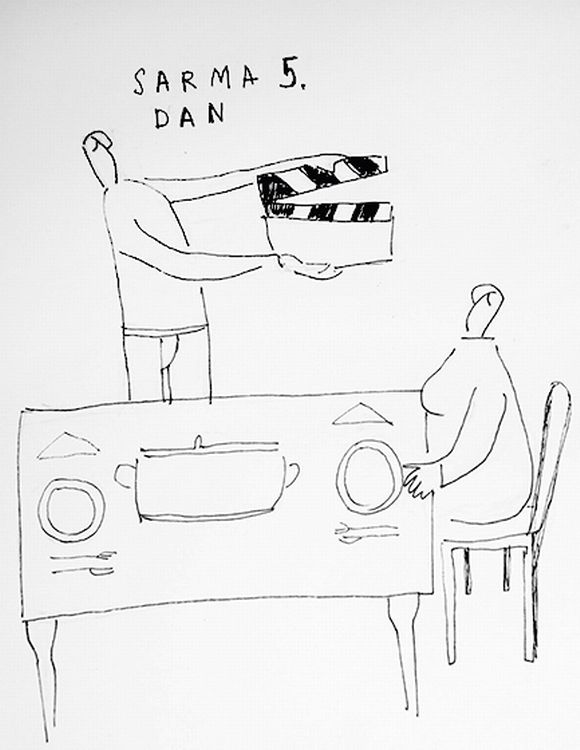
33. Tisja Klajkovic Braic
Want to learn about Dalmatian culture and its curious ways? Having been given the book for Christmas, I was introduced to the fabulous work of Tisja Klajkovic Braic and her superb caricatures of Dalmatian life. I was thrilled when Tisja agreed to a TCN interview, which you can read here.
34. Part of Michael Jackson's Earth Song video was shot in Karlovac
This goes straight into my top 10 random facts about Croatia section. The video for Michael Jackson's single; “Earth Song”, was released in 1995 and was shot in four locations around the globe. It dealt with subjects of environment and animal welfare with scenes of illegal poaching, destruction of the rainforest and war. The war scenes were shot here.
Karlovac was on the frontline in the Homeland War from 1991-95 and was severely damaged as a result. The location used in the video was the suburb of Turanj which was practically levelled over the four years of fighting.
35. I learned how to speak in public
I am very grateful to Ana Simunovic and her incredible stomach movements (seriously impressive) for helping me learn how to overcome one of my biggest fears in life - public speaking. I am fine one to one, or on television, but if I address a crowd, I choke. As TCN expands, so too does the list of speaking engagements. I know it is the sensible thing to do, but it was only after Ana's help that I finally managed to conquer my fear. I even remember to breathe these days. Here I am at LEAP Summit in Zagreb with one of the most important lessons of all if we are going to build a better Croatia - Injecting Positivity into the Default Negative Croatian Mindset.
2020 was definitely not a great year, but the opportunities for learning and improving are there to be taken. Many thanks to the many of you for your support and help in helping my education of this country that keeps on giving.
What lessons and new experiences will 2021 bring?
How to Reset the Default Croatian Online Reaction from Negative to Neutral
December 18, 2019 - Have you noticed that the default Croatian online reaction to good news from Croatia is usually negative? How to move that from negative to neutral.
Yesterday I decided to conduct a fun experiment.
Having heard recently that I never write anything positive about Croatia, ever, and that I am also a millionaire and run TCN as a hobby, I decided to write an article which has been in my head for a while called Why I Live in Croatia: 30 Incredible Discoveries in 2019 Alone.
In the article, I wanted to show what an incredible country Croatia is, Full of Experiences, and just what is possible to see and do in a 12-month period. But not from the point of view of a rich foreigner with money to burn, but through the perspective of someone living in Croatia, who had an idea and started a business here with 100 euro in his bank account. All this I explained in the article.
And the first reaction was not long in coming when I shared it on a Croatian Facebook group. A very predictable reaction and the default Croatian online reaction to anyone writing about positive experiences living in Croatia.
Zeljko stated that Croatia was a great place to live if you had lots of money, but all other people should leave as it is a terrible place to live unless you are rich.
I very rarely read comments on social media, partly due to time but also due to that default Croatian online reaction of negativity, and I almost never comment, but I decided to take young Zeljko to task just for fun, and I pointed out that he clearly had not read the article. He fired straight back, asserting his right to have his opinion, and that something along the lines that it was impossible to live well in Croatia without being very rich. While agreeing with young Zeljko's right to an opinion, I respectfully disagreed and invited him to read the article for an example of someone who did not fit his argument. Zeljko went on to read the article, then commented that his opinion had been nothing personal. I was, in fact, according to Zeljko, doing a very good job.
And then he deleted the thread.
A little later, in the comments of the same group, Kaja came on bombastically to state that Croatia was an easy place to enjoy if you were a foreigner with lots of money to throw around, very hard to live for an ordinary person trying to make ends meet. I invited young Kaja to actually read the article.
She obviously did because she then deleted her comment.
The default Croatian online reaction had gone from negative to neutral. In both cases, pre-conceived ideas were challenged by some real experiences from the present, and those experiences did not fit their narrative. Bear with me, I am getting to my point.
Another comment elsewhere highlighted our old friend, Is a foreigner allowed to have an opinion in Croatia? This is one of my favourite aspects of the Croatian mentality. Foreigners simply cannot understand the complex realities of Croatia and its society. Their observations are almost always surface and superficial, usually formed in that honeymoon period when they are intoxicated by the lifestyle and natural beauty shortly after arrival. And I agree with this up to a point, one of the reasons I wrote The 3 Stages of Learning for a Foreigner in Croatia: Love, Hate & Nirvana.
The commentator above was being dismissive of the article (without reading, default negative) because it had been written by a foreigner who had only been here a short time (in his head, it turns out from a later comment, a tourist for a year), and so it would be interesting to see this Croatia through his rose-tinted glasses a decade later. When challenged, and he realised that the article was written by a foreigner living her for 17 years, the online sentiment went from negative to neutral.
Such negativity from Croatia's army of keyboard warriors (probably a bigger number than today's half a million veterans) is as much a part of Croatian society today as supporting the football team at the World Cup. I used to think that such comments - many of which come from the diaspora - were really ignorant. And I still do, but now in a different way.
I used to think that such comments were ignorant in the sense that they were uneducated, but the longer I live here, the more I realise that they are ignorant in the sense that many people making them actually have absolutely no idea of what real life is like in Croatia today. They have been brought up with one narrative, they maybe experience their homeland once a year with a couple of weeks on the beach in the summer, and that's it. Their homeland is a corrupt country run by Communists where everything is shit, apart from the natural beauty and the country's traditions.
But there is a good reason for this ignorance.
Nobody is telling them otherwise, certainly not in English.
The comments kept coming. Some sound advice in this comment above, but it also triggered another thought in my head, which I figured out a few months ago. Where do people interested in Croatia but do not speak the language go to get their information about what is happening here? There are some websites, a few blogs, but almost exclusively, they focus on happy tourism and sport stories and what to do here on holiday, which is fine. But for people trying to understand the realities of life? There is almost nothing. There are lots of bloggers passing through with their superficial observations, but people who have lived the daily grind for years and writing openly about the good, the bad and the ugly in Croatia? It almost does not exist.
And I think it is an essential ingredient to have in the mix if we are to bring the mindset of the diaspora closer to understanding the realities of Croatia today.
Is Croatia the most corrupt country in the EU? Almost certainly.
Is it the most heavily taxed? Almost certainly.
Is it impossible to get ahead in the system without a connection? Almost certainly.
Does it offer the best lifestyle in Europe? Absolutely.
Do you have to be very rich to enjoy a good life in Croatia? It certainly helps, but absolutely not.
I actually agree with Matija Babic, owner of Croatia's largest news portal, that the best thing people can do for a better Croatia is leave and pay taxes elsewhere, so that they stop supporting the current system. Sadly, I think Croatia needs to fail to rise again. Some will say that should be achieved through lustration, so that Croatia can heal its wounds from the past, but just as I don't think everyone will leave to make Croatia fail, so I think lustration is fairly unlikely. So we are more or less stuck with the current mess, and we may as well do the best we can.
A few years ago I received an email from California from a second-generation Croat who loved his country even though he had never been. He had been following our site for a few years and was a big fan, but observed that my writing about Croatia was different to what he had learned in his community back home. And having read many articles, he realised that his perception of Croatia - hitherto exclusively shaped by his disapora community - was changing.
There are SO many good stories, and they are not being told. But you know what happens when you start to tell them, and keep telling them? People start to listen. The narrative of the reality of people living the daily grind but actually surviving and enjoying life in Croatia needs to be told more often. This isn't the story of a rich foreigner waking up and deciding what fun to have today. TCN is a Croatian business like many others, struggling to make the month VAT bill and salaries on time (doing my best guys, coming soon...).
A few years ago, a schoolfriend I had not seen for 25 years came on a sailing holiday on Hvar with his family. It was great to see him and the years rolled back, and his kids looked on in wonder as I told them about the day their dad ran away from boarding school. These days he is a partner in a major accountancy firm in the UK, has his own boat, a house with mortgage outside London, an annual train ticket into the city centre, and a salary I can only dream of. He leaves the house at 6am Monday to Friday, returning home 9 pm, and can afford fantastic holidays to places like Hvar.
A real-life parable of the billionaire and the fisherman. And, as I went to pick up my daughter from kindergarten the following week, before spending time with her on the main square over a late morning cold one, as I did every day, I realised who I would rather be.
If you are expecting to find New York salaries and Western efficiency with the idyllic Croatian lifestyle, you are going to be disappointed. Yes, Croatia does have huge problems and desperately needs a political and judicial system that works for the people of Croatia, not the people in the system. And it is easy to trash everything dismissively about life here from diaspora communities far away.
But they are totally disconnected from the realities of Croatia today. And nobody is to blame for this disconnect, because nobody is writing (certainly in English) about what is happening in Croatia today away from the traditional tourism stereotypes, so that default Croatian online negativity is understandable - the perceptions are shaped by diaspora communities.
One of the things I love about my 'job' is the access to incredible stories I get, which are untold by others (see the 30 highlights of 2019 for example). And because nobody else is writing them, I come across as a better writer than I am. I am also followed by thousands in the diaspora, some appreciative - many not so much - of my work. And although the number might be small, I know for a fact that we have changed some mindsets in the diaspora in a positive way. It doesn't bring cash, but it does bring a certain satisfaction.
What if a lot more people were to tell their stories, to show the many upsides to living here? A gentle trickle of positive and honest reporting of the realities here. It can be bad in Croatia, for sure, but it is certainly not all bad as is often portrayed.
Rather than focus on the bigger picture, I personally prefer to focus on the smaller stories which are actually the biggest stories of all. I particularly enjoyed recently writing about my visit to Tokic Croatia, the car parts sales company in Sesvete. In an age where everyone is complaining about doing business in Croatia and the lack of qualified staff. here was a 100% Croatian family business which was not only at the cutting edge of technology and building up human capital, but also named by the London Stock Exchange as one of the top 50 most innovative companies in Europe. It is an incredible story - read it here.
It is also a story that few people outside Croatian business know about. And while Tokic is an exceptional story, it is far from unique. Last week I attended a business breakfast for a small consulting company called Venatus Jones, 4 returnees with vast business experience in Australia, Germany and Canada. They have a great programme to help Croatian SME businesses to adapt and compete in the modern world, the type of grassroots initiative which will not make the news headlines (at least not immediately) but will contribute to slow but permanent positive change. In fact, the consultancy company has already played a small part in a great Croatian success story, as its first-ever client, Bagatin Clinic, was named International Plastic Surgery Clinic of the Year 2019 at the International Medical Travel Journal awards in Berlin. Another great Croatian success on the global stage.
Is it possible to succeed doing business in Croatia? Default Croatian online reaction - negative. But the reality is that yes, it IS hard, but there are SO many success stories of businesses which are succeeding.
They are just not out there for the world to know in English. And once they are, and in greater number, there will be a very slow shift in that default Croatian online response from automatic negative to something towards neutral.
Rather than fighting the keyboard warrior battles in the comfort of your bedroom thousands of miles away from the Homeland, why not enjoy six months of reality in Croatia and learn to appreciate the good, the bad and the ugly of Croatia today?
We have all three in abundance, but I still wouldn't live anywhere else.
Want to know what it is like living in Croatia? Check out the Total Croatia guide.
Why Ownership of a Holiday House (Even on Vis) is No Longer Fun
November 28, 2019 - Life as the owner of a holiday house in Croatia used to be a lot easier, even on Vis, says longterm Visophile Miles Robinson.
In 2003 my wife fell in love with Vis during a chance visit and by November we were the proud owners of a structurally sound (except the roof!) 200-year-old house in the centre of Kut.
We were lucky. There was only one owner to deal with and we were quickly introduced to a builder who had been ‘broken in’ to English tastes in internal decoration and fittings by two other kindred spirits.
The house has two floors above the konoba, plus a roof space, and originally had four bedrooms, etc. However, in talking to friends at home we were advised “you can never have too few bedrooms” so we removed the upper two bedrooms. This created a large open plan sitting room (which my wife rather grandly calls the ‘salon’!) which has a view over roofs to the bay on one side and roofs to the hills over Kut on the other.
The house was finished and occupied in 2005 and has proved a comfortable, relaxing bolthole for the two of us plus, occasionally, another couple. Fairly soon we made local friends and discovered that the duties of guide and meals in house can take the edge off the pleasure of additional good company after the novelty wore off. The advice was definitely sound!
After a year or so we discovered that other foreign owners were letting their houses when empty. Obviously, this benefitted both the island with extra tourist revenue and more than covered the running costs of the house for the year.
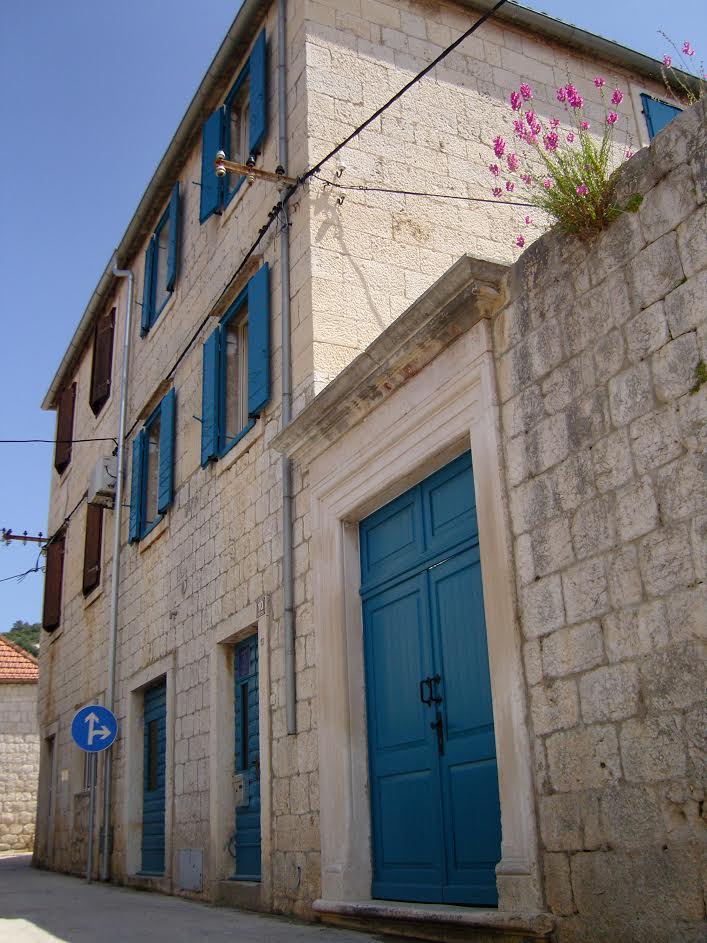
The island authorities, in line with their laissez-faire ‘pomalo’ attitude to island life in general, seemed to be relaxed about our activities
No. It couldn’t last! But now, from the sublime to the ridiculous, the bureaucratic form-filling has got too much, in addition to problems with our bank.
Some of the problems we have brought on ourselves, by asking the authorities what rules, regulations and taxes we were subject to. Big mistake! We should have just kept our heads down.
First, it was the eVisitor system, which requires the owner of ‘every’ rented house to log the full name, date of birth, and nationality, plus arrival and leaving dates, of every person occupying the house. This seems to be exactly the same system that applies to hotels. We got over this by employing a local agent (for a commission) and giving him our personal login and password to access the system!
However the big body blow came in 2017 when we were told that not only was our rental income subject to 13% VAT, backdated to 2015, but that monthly returns needed to be submitted (including zeros) for every month from January 2015; and that these returns needed to be filed by a tax accountant. The only accountant on the island quoted 650 Kn per month, but we found someone in Zagreb who would do it for 450 Kn, plus 25% VAT of course!
And then Splitska bank was sold to Hungarian owned OTP. The transfer of accounts was done without problems, but we were soon told that the only way we could access our accounts was via their mobile app. In the meantime, we had accepted rental deposits from foreign tourists renting our house which were due repayment in their own currency after they had left without damage. OTP told us that their internal rules prevented them from allowing non-resident account holders (us) to make any payments to foreign bank accounts.
Attempting to speak to someone in authority via their “helpline” proved impossible, so I contacted OTP’s Deputy General Manager in Hungary who, eventually, put me in touch with their Complaints Department in Zadar. That was in August.
I have recently received confirmation that they will not lift these restrictions on non-resident account holders, which I have now reluctantly accepted.
It is now finally clear that OTP has no interest in offering a full banking service to non-residents.
When we return to Vis next May I shall see whether the only other bank on the island, Erste, also adopts the same restrictions on non-resident account holders.
I wonder if any of your other non-resident readers have experienced similar problems and are also becoming disillusioned with the obligations of holiday homeownership?
American YouTuber in Croatia Uploads Video Series: Living in Croatia
June the 2nd, 2019 - Croatia has a growing number of foreign residents in spite of the mass exodus of Croats fleeing abroad for better lives, more job security and more promising economic conditions. But just how does one move to Croatia? What is the process like?
These are many of the questions that pop into your head as soon as you start to become serious about the subject, and when it comes to residence permits, requests, applications and making yourself legal here, we've answered as comprehensively as we possibly can for both EEA citizens and third country nationals, regardless of your personal situation, in this article. Please pour yourself a large rakija before reading.
Still, you've likely got more questions and you'll soon get to know that the Croatian law appears to change like the direction of the wind, and what you're told seems to heavily depend on where you ask, who you ask, and just what side of the bed whatever official you're talking to has woken up on that morning.
Kaleigh Hendershot is an American expat living near Zagreb, and she has a YouTube channel dedicated to her life in Croatia, entitled ''This Croatian Life'', where she makes usually comical videos about her experiences dealing with everyday life in Croatia, from finding a job to funny customs and comparing life here with her Croatian partner, to her former life in America.
While the majority of her videos are on the more amusing side of life in Croatia, such as the dangers of the dreaded propuh and what Croats say incorrectly in English, she decided to upload a series on ''Living in Croatia'', in which she discusses the more serious and practical aspects of life here, and details her personal experiences of those things, making sure to note what I already have above: Everyone's experience is slightly different.
From legalities, practicalities, job searching, language and general living, Kaleigh has detailed it all in her Living in Croatia series, of which there are currently two parts.
If you want to grin at some of the absurdities of life in Croatia, as well as learn what moving here might mean for you, especially if you're a US citizen like Kaleigh is, she's worth a watch.
Here are the first two parts of her Living in Croatia series:
Make sure to follow our dedicated lifestyle page for much more.
From Los Angeles to Split, How One Foreigner Fell in Love with Croatia's Coffee Breaks
It’s no surprise that more and more young people are leaving Croatia in search of a better life, while on the other hand, more and more foreigners are coming to live in Croatia. Today, we bring you the story of one foreigner who left the ‘American dream’ to live in Split, reports Novi List on April 22, 2019.
How did a 30-year-old who studied and worked in Los Angeles decide to work and live in Croatia, and precisely Split? How do foreigners increasingly choose Croatia as a place to live in the middle of the great wave of youth emigration to Ireland and other countries around the world?
Meet Balki, born in India who left to study and work in Los Angeles. In the 'City of Angels', he worked in the IT sector in the video game industry and wore the title of a Games User Experience Researcher and Technical Analyst. Despite a good job in Los Angeles, four years ago, Balki decided to make a significant change in his life and move to Split. However, he did not plan on staying in Split long, but only for a short time before returning to America.
Balki had heard about Croatia and its history. He knew Croatia was a developing country. And he saw it as a personal challenge after which he would return to America.
However, while working in Los Angeles., an opportunity from Balki's company opened to work at a branch in Split. Balki, determined and open to new ideas, wanted to take advantage of the offer and experience what it was like to live somewhere in Europe. After scrolling through pictures of the Dalmatian capital and making several video calls with the employees in Split, Balki decided to give Split a chance.
“I have to admit, my first reason for coming to Split was more logistic, it was easier to get a work permit in Croatia,” Balki said honestly.
But as the conversation continued, Balki spoke about the people he met who became friends for life. Balki quickly accepted the way of life in Croatia and how day-to-day living is far more enjoyable than in Los Angeles. Furthermore, Balki found a new job in Split and is employed by the international IT company Typeqast. Balki said he is delighted to work with clients from all over the world and with his talented colleagues.
"Although L.A. is a city full of fun, Split has something that calls you to stay, and it has become more difficult to think about returning to L.A."
This successful 30-year-old lived on the coast of Chennai, where he grew up before moving to L.A. and Split where he lives today.
"I love life on the coast and everywhere is beautiful, but I have to admit that no one likes their coast and sea as much as the Dalmatians do. Every day I am thrilled with the beauty of the Croatian coast.
As far as work differences are concerned, I can say that in the companies I've worked for so far, everything runs at a high level and it is not too different from America. It's great to work in international companies because there are no language barriers for working with foreign clients and all communication takes place in English, so it's not important whether you live in Croatia or anywhere in America. But one everyday thing I was surprised and thrilled about was the 'coffee break'. Although it sounds like a waste of time, Croatians actually use them very wisely, and because of them, you can be more efficient at work. It’s fascinating. At the moment I am so pleased with my job and the support we have from the leadership of the firm that I no longer think about when I will return to L.A.”
How is the emigration of young people from Croatia seen by someone who came from L.A.?
"I think in most cases the emigration of the youth has almost become a normal thing and young people are trying to test their limits. This ‘brain drain’ is more seen as a result of youthful curiosity than bad conditions in the state. On the other hand, there is, of course, a state that in my opinion does not give enough support to young people."
While a good job and working conditions are essential to the quality of life, those who work in Croatia also have its natural beauty, pleasant climate and at any moment someone, someone to drink coffee with. Balki is yet another example of a foreigner who came for work and stayed for the Croatian way of life.
To read more about lifestyle in Croatia, follow TCN’s dedicated page.




